Latest news
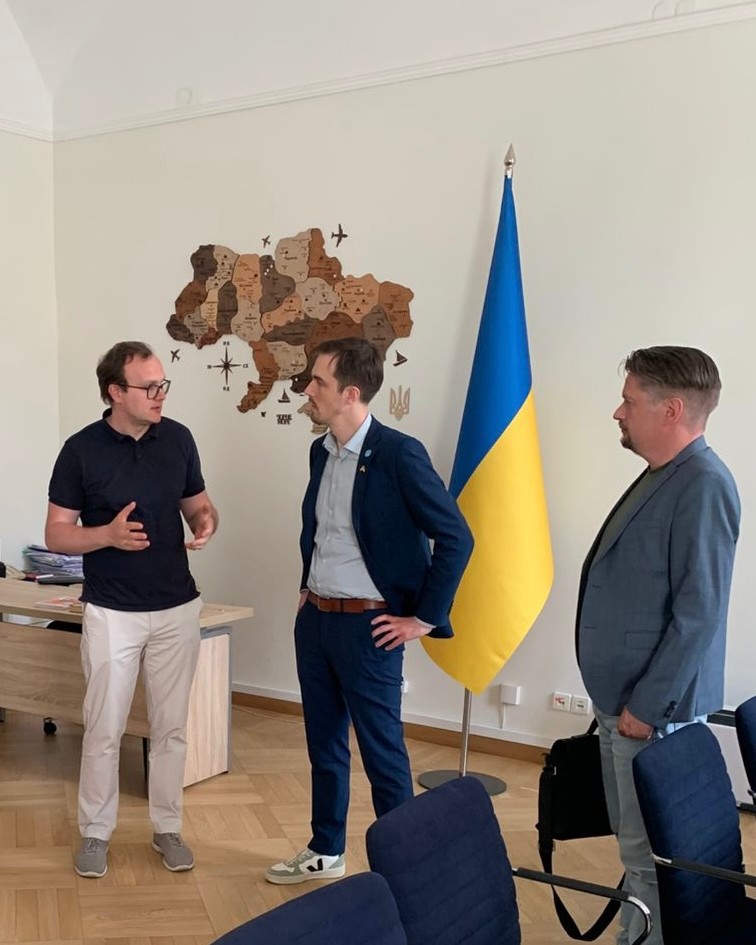
5. July 2025
AGNF visits project partners in Ukraine
As part of a trip to Ukraine lasting several days, we visited our local project partners together with GIZ representatives from the Clinic Partnerships funding program.During our trip to Ukraine in June, we were able to strengthen existing contacts and make new ones. The trusting cooperation under difficult conditions is greatly appreciated by all those involved.
Our Ukraine coordinator visited several clinics of the hospital network in Lviv, including the First Medical Union, the St. Nicholas Children’s Hospital and the main clinic St. Panteleimonos. GIZ representatives from the Clinic Partnerships funding program, which supports our involvement in Ukraine, were also involved in the discussions.
During the visit, we familiarized ourselves with the work of the facilities and discussed current projects. In particular, the importance of further support in Ukraine was emphasized.
The clinics mentioned above do not only accept patients from the Lviv region, but above all wounded civilians from all parts of Ukraine. This puts a great strain on healthcare provision.
We met with Deputy Mayor Andriy Moskalenko at Lviv City Hall for a constructive discussion, which included many new ideas and concrete points of contact.
Several ongoing projects were presented, which are being implemented in cooperation with the GIZ funding program Clinic Partnerships and are of great importance for the city.
The current challenges of the city in the field of emergency medical care, ongoing projects and next steps of the AGNF in Ukraine as well as the strengthening of Lviv as an educational center for emergency medicine were discussed.
At a meeting at the Ukrainian Ministry of Health, representatives of the ministry, the GIZ Clinic Partnerships funding program and the Institute for Emergency and Disaster Medicine reflected on the past few months with a particular focus on the completed project to build capacity in medical care for the population. The project partners expressed their gratitude for the cooperation so far and showed great interest in further joint projects.
The development and implementation of structured trauma care is one of the central goals of the AGNF in Ukraine. We therefore used our stay in Ukraine for a technical meeting with our local partners from STC in Kyiv. They train both medical professionals and civilians in advanced first aid, always with the aim of ensuring that the Ukrainian population can be treated quickly and effectively in an emergency, thereby saving lives.
Together, we discussed and planned important next steps on the way to state recognition and the introduction of new, practical ITLS courses specifically for Ukraine.
We also had the opportunity to visit the renowned medical faculty “National Medical Ivan Horbaczewski University” in Ternopil. In addition to an intensive professional exchange on the education and training components of our joint projects, we had the unique opportunity to take part in the graduation ceremony for over 1,000 graduates, including those studying human medicine, dentistry, medical psychology and nursing science. In addition, a new emergency medical services course in the field of pre-hospital emergency care, which is important for the whole of Ukraine and will be offered by our partner from next year, was presented. We are proud to be part of this international collaboration!
The trip concluded with a visit to the Unbroken Foundation rehabilitation center in Lviv. Existing activities were discussed, further activities were planned and the possibilities of new projects were discussed. Our focus here is on meeting local needs.
Throughout the trip, the importance of continued support in Ukraine and the trusting cooperation was emphasized by all sides. Further information and the opportunity to support our commitment in Ukraine with a donation can be found at AGNF worldwide.


27. June 2025
Visit by a Moldovan delegation
At the request of the Moldovan Ministry of Health in cooperation with the Federal Ministry of Health, we were able to welcome a Moldovan delegation to Moldova and provide them with impulses for structured training programs for rescue service employees in Moldova.A study trip on the topic of “Strengthening the capacity of emergency medical training” brought a delegation from Moldova to us. Its primary objective was to explore best practices in the training of emergency medical personnel and to gain impetus for structured training programs for emergency medical personnel in Moldova.
At the end of June, we welcomed a Moldovan delegation with representatives from the Ministry of Health, the administration of the National Center for Preclinical Emergency Medicine (CNAMUP), the Emergency Medicine Training Center and the National Emergency Call Center. The study trip on the topic of “Strengthening the capacity of emergency medical training” was requested via the Moldovan Ministry of Health in cooperation with the Federal Ministry of Health.
The visit began with an official welcome from the Federal Ministry of Health, our Chairman of the Board Klaus Meyer and our international projects team. A special highlight for the delegation was the participation in the large-scale training day of our vocational schools for emergency paramedics. This gave them the opportunity to experience realistic scenarios, including a birth, a traffic accident and a domestic violence situation involving the police.
The insights into the high-quality and practical training met with great interest from our guests and left a lasting impression.
The second day of the delegation’s visit was all about practical training. Using the example of an ALS (Advanced Life Support) course at the ERC, in which students from our vocational schools for emergency paramedics took part, key elements of the training were demonstrated. Our Moldovan partners took the opportunity to talk to our deputy principal about special didactic features and exchange experiences from everyday training.
This was followed in the afternoon by a visit to the ILS Nuremberg, where the processes and structures of emergency call dispatching in Bavaria were explained in detail. The delegation then visited the modern Nuremberg fire station.
Finally, we presented our bildung37° simulation center, where our students and course participants train under realistic conditions.
To kick off the final day, our colleagues from FÜRTH SCHOCKT! gave inspiring insights into the project. The establishment of local structures that enable a rapid response in the event of sudden cardiac death was met with great interest by the delegation. Afterwards, the program at the Bavarian Red Cross Erlangen-Höchstadt included an analysis of relevant statistics and a tour of various ambulances. Our guests received comprehensive information on the equipment of the vehicles and emergency backpacks.
A visit to Fürth Hospital provided an insight into the processes of the emergency department, followed by an exciting tour of the department.
The event concluded with a visit to the Bavarian Association for Rescue Services and Fire Brigade Alerting, where important legal aspects of emergency care were explained in an understandable way.
It was a great pleasure for us to give our guests a comprehensive insight into our work and the acute and emergency medical structures in Germany. Many thanks to our partners who helped shape the program!


24. June 2025
Major training day for our vocational schools for emergency paramedics
The students from our vocational schools in Roth and Stein were able to train intensively and gain valuable experience during dozens of exercises in the Stein city area.An accident at work, a pre-hospital birth, a resuscitation or a traffic accident. The tasks that the students from our vocational schools for emergency paramedics had to master as part of our action day were challenging and varied.
The students practiced numerous emergency scenarios in Stein. They also practiced working together with the fire department and police. The large-scale training day is designed for students in their third year of training and is an important milestone on the way to the upcoming final exam.
12 student teams, each consisting of two to three members, were able to apply their knowledge in a realistic yet protected environment and take away valuable tips thanks to the direct feedback from their teachers. Mimes and medical training dummies made the missions authentic. In total, around 130 students, teachers, practical instructors and rescue workers were involved in almost 100 operations.
Sebastian Habicht, head of the vocational schools for emergency paramedics, was delighted with the students’ great commitment and the cooperation with numerous partners: “The large-scale exercise day is an absolute highlight in the training to become an emergency paramedic. Our students benefit enormously from the high density of challenging scenarios and the cooperation with the fire department and police.”
Aid organizations, including the BRK Stein, the Johanniter Unfallhilfe Schwabach, the SKS Ambulanz and the RKT Rettungsdienst supported the exercise, for example by providing emergency vehicles. The FORUM Stein, the town of Stein and the Stein grammar school provided facilities.
The joint scenarios with the Stein fire department and the Stein police station are valuable for everyone involved. The rescue and treatment of a trapped accident victim was practiced with the fire department, while the focus was on cooperation with the police in a case of domestic violence.
In addition to an advance announcement, the Nürnberger Nachrichten, frankenfernsehen.tv, as well as Bayern 1 and br24.de reported in detail.
Our heartfelt thanks go to all those involved and supporters, without whom this day would not have been possible!

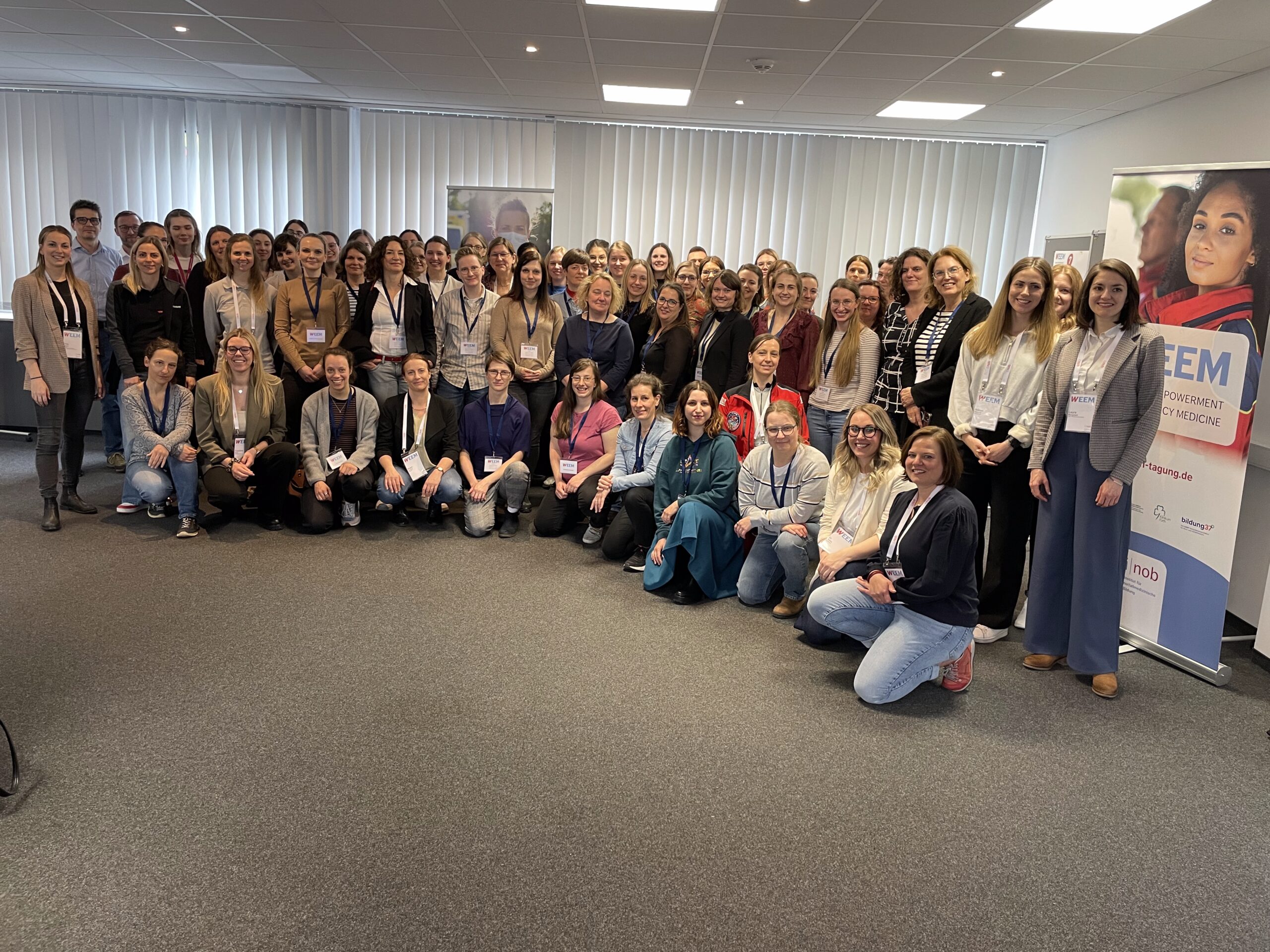
29. March 2025
WEEM – Women Empowerment in Emergency Medicine
At the INOB's first Women Empowerment in Emergency Medicine (WEEM) conference, visitors were treated to an attractive program of workshops, presentations and network speed dating.The first Women Empowerment in Emergency Medicine (WEEM) conference brought together around 80 experts from acute, emergency and intensive care medicine at the INOB training center on 29.03.2025. In addition to practical workshops and presentations, the event provided an important platform for networking.
This conference was deliberately organized on an interdisciplinary basis in order to bring together female doctors, nurses and employees in the emergency services from all over Germany. This included representatives from all national associations for emergency medicine, who together set a strong example for equality and diversity. Interactive workshops addressed topics that encourage women and help them to progress: Rhetoric, finance, women in leadership and personal development. The focus was not on quotas, but on fair opportunities, equal representation based on qualifications and structural support to make career paths for women in emergency medicine more sustainable.
“Specialists are the mainstay of acute, emergency and intensive care medicine. These are often women, but it is comparatively rare to find them in management positions in these professions – even though their skills and perspectives are a great asset,” says Mirjam Schmidt, Managing Director of INOB.
At the network speed dating session at the start of the event, it became clear how valuable the joint exchange is. The main results of the conference will be used to produce a position paper, which will be published shortly.
Cooperation partners for the event were Fürth Hospital, the Fürth Emergency Medicine Working Group, the Technology Transfer Centre for Digitalization in Emergency Medicine Education at Ansbach University of Applied Sciences in Stein and bildung37° – Die AGNF Kompetenzmanufaktur für Akut- und Notfallmedizin.
The conference is also supported by the following institutions and associations:
AG Frauen der Deutschen Gesellschaft Interdisziplinäre Notfall- und Akutmedizin
Bayerisches Rotes Kreuz
Deutscher Ärztinnenbund
Projektgruppe Empowered Women in Medicine der Jungen DIVI
Die Chirurginnen e.V.
Forum Anästhesistinnen (BDA)
DRF Luftrettung
Inspired by the success of the first edition, a new edition is already being planned for March 2026.

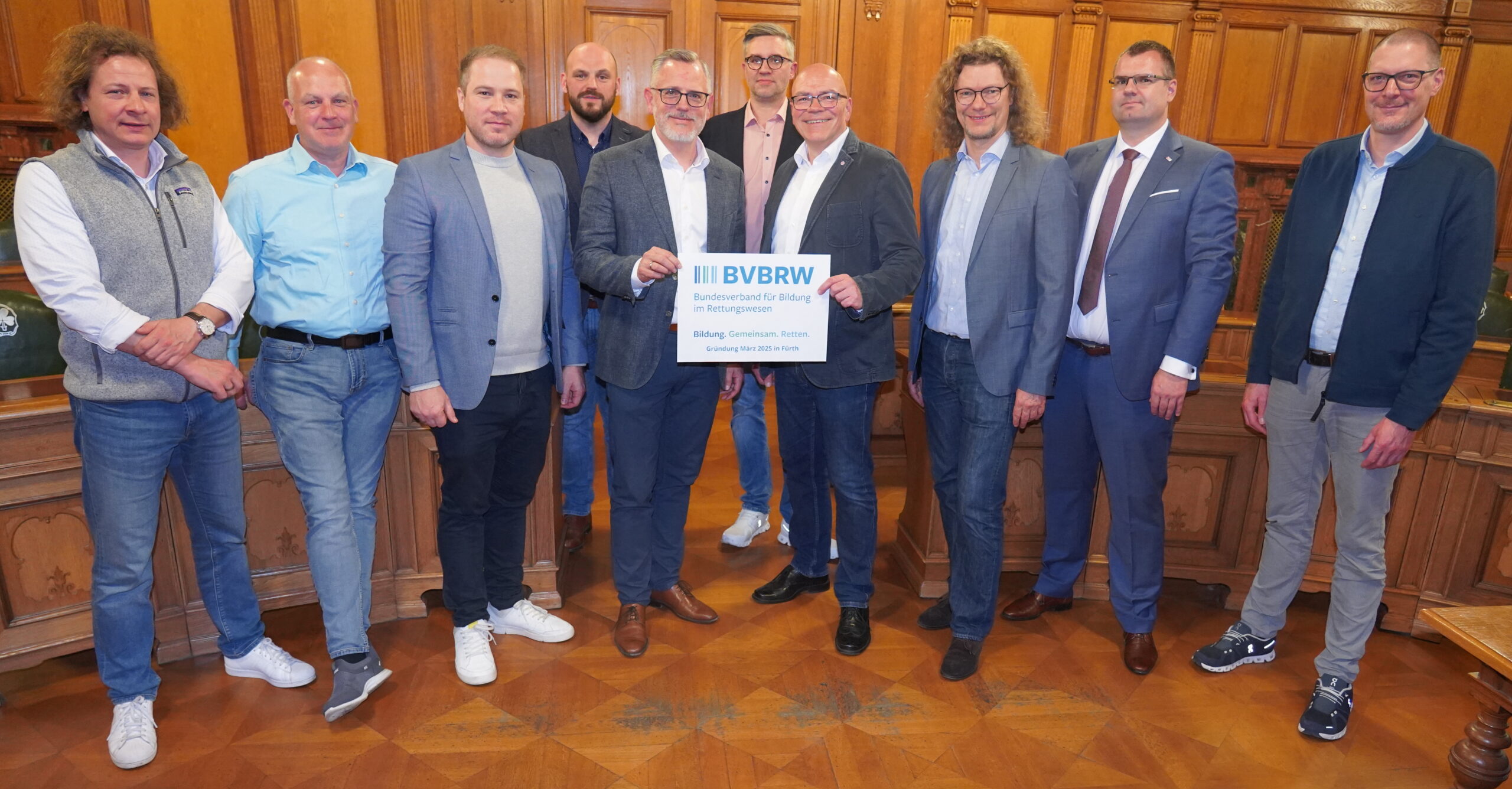
28. March 2025
Federal Association for Education in Rescue Services (BVBRW) founded
The Federal Association for Education in the Rescue Sector (BVBRW) was founded at the end of March and is committed to the further development of vocational training in the rescue sector.The founding event of the Federal Association for Education in the Rescue Service (BVBRW) took place as part of the 1st Rescue Service Education Congress, with around 150 founding members joining.
The BVBRW is committed to the further development of vocational training in the rescue services, which is based on professional training standards and a scientific foundation. The association sees itself as a network and advocate for the interests of politicians, authorities and organizers. Around 150 congress participants took the opportunity to join the association.
Klaus Meyer and Kersten Enke were elected as the first presidents. “For me, membership of the BVBRW not only means access to a strong network, but also the opportunity to play an active role in shaping the future of paramedic training. It’s a good feeling to be part of a community that is really committed to the quality and further development of our vocational training – in a well-founded, serious and realistic way,” says Enke, who heads the Johanniter Academy Lower Saxony/Bremen in Hanover.
At www.bildung-rettungswesen.de you will find information on the BVBRW’s statutes, sections and objectives as well as the opportunity to become a member.

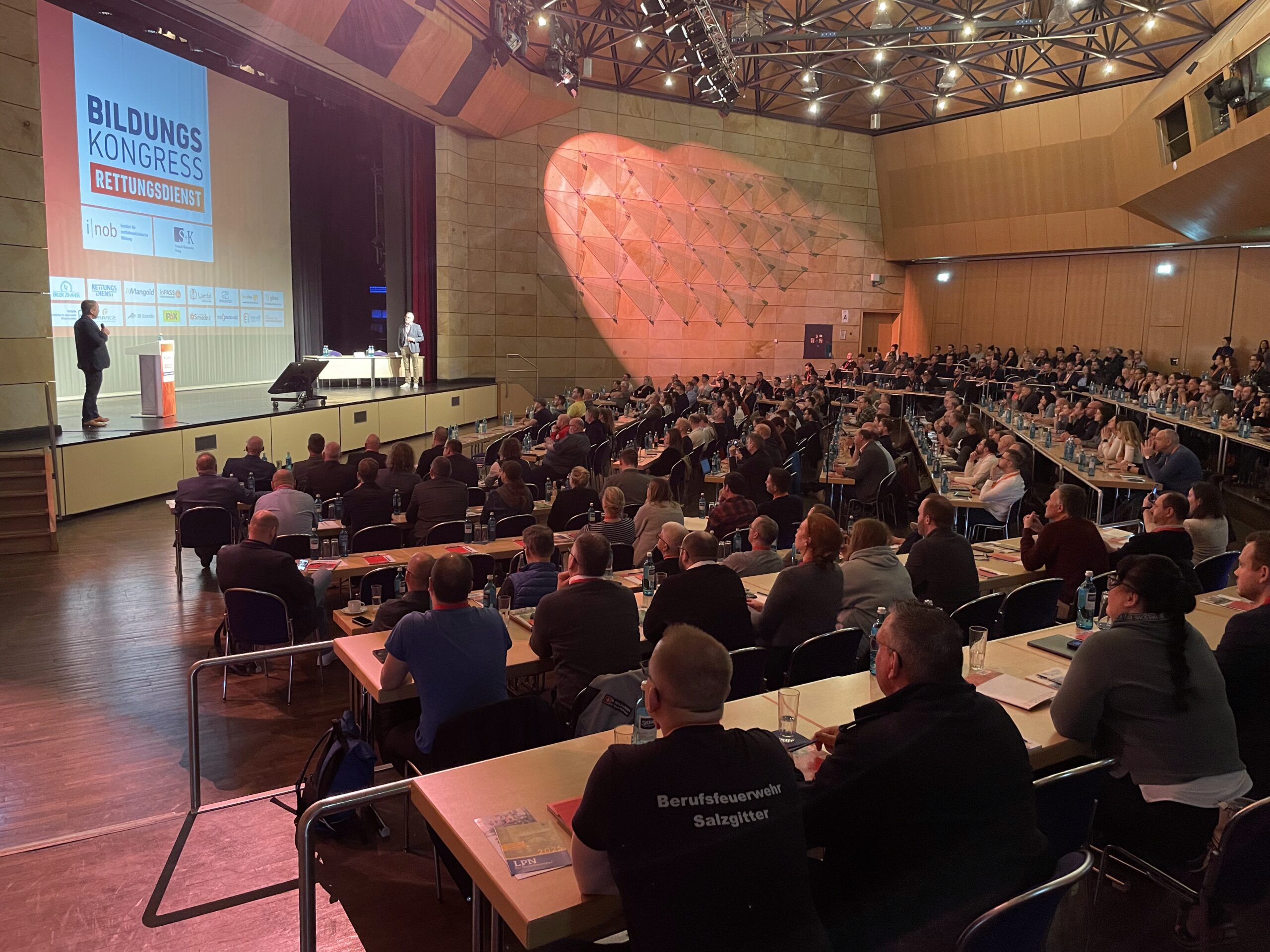
27. March 2025
1st Rescue Service Education Congress
Over 350 trade visitors and numerous industry exhibitors came together at the 1st Education Congress for Rescue Services in Fürth on March 27 and 28.The Institute for Emergency Medical Education (INOB) and Stumpf+Kossendey Verlag welcomed specialists in rescue service education from all over Germany and beyond to the 1st Rescue Service Education Congress in the Fürth City Hall.
“Strengthening education in the rescue service” was the motto that attracted educational stakeholders from rescue service practice, vocational schools, universities and associations to Fürth. The initiators of the congress were committed to the further development of vocational training and quality assurance in the emergency services. The target group of the event was teachers, practical instructors, university lecturers and school management, as well as anyone interested in shaping future-oriented rescue service education.
Discussions included the challenges and opportunities with a focus on the three-year training course for emergency paramedics, interprofessional collaboration, intersectoral emergency care and the ongoing debate about academization. With guest speakers from Austria, the Czech Republic and Switzerland, the international perspective also played an important role.
Klaus Meyer, Managing Director of INOB, was delighted with the successful premiere: “The great response and the consistently positive feedback from participants clearly show that such a format is desired and necessary. We offer a forum for collegial exchange, inspiring perspectives and practical impulses. We are delighted that so many thought leaders in emergency services education have found their way to us.”
Encouraged by the success of the 1st Rescue Service Education Congress, a new edition is already being planned for 2026.

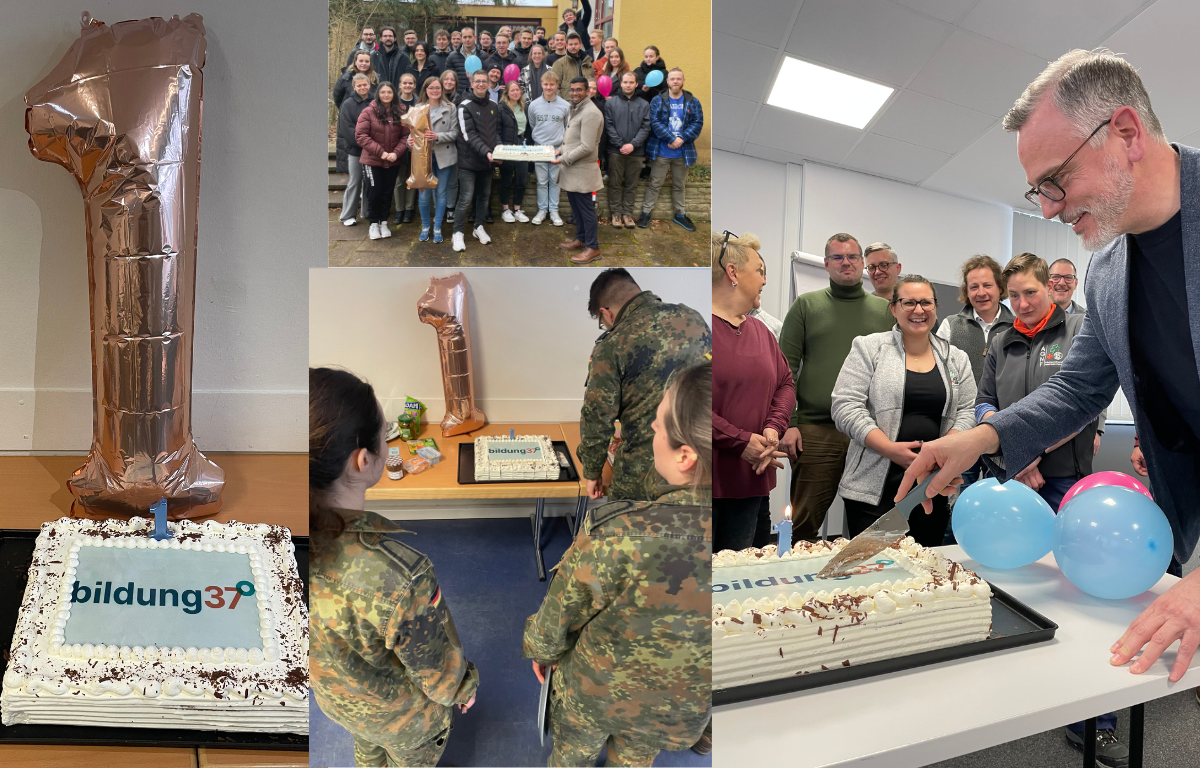
2. March 2025
1 year bildung37°
At the end of February 2024, AGNF repositioned its educational offering under the name bildung37°. On the one-year anniversary, we look back on what we have achieved.On the occasion of bildung37°’s first anniversary, there was reason to celebrate. The AGNF’s education brand can already boast impressive figures in its first year.
At our locations in Stein, Fürth and Roth, we celebrated bildung37° ‘s first birthday with cake for our course participants, students and the entire team. Because looking back on the first twelve months is more than pleasing:
Over 4,000 participants attended bildung37° events in the first year. These included 139 students training to become emergency paramedics, 206 participants in our paramedic courses and 1,184 participants in ERC course formats.
21,342 shocks were delivered in resuscitation training courses. 32,225 hours were taught by our lecturers in courses and classes at our vocational schools. During the first year of bildung37°, 25,169 cups of coffee and 1,678 liters of milk were consumed. Around 8,000 syringes were used in exercises and training sessions.
41,309 km were covered on trips to in-house courses. Around 70 team members and 150 lecturers contribute to the success of our competence center for acute and emergency medicine.
Many thanks to our course participants, students, lecturers, partners and the entire team who work on bildung37° both in front of and behind the scenes!
We look forward to many more successful years.

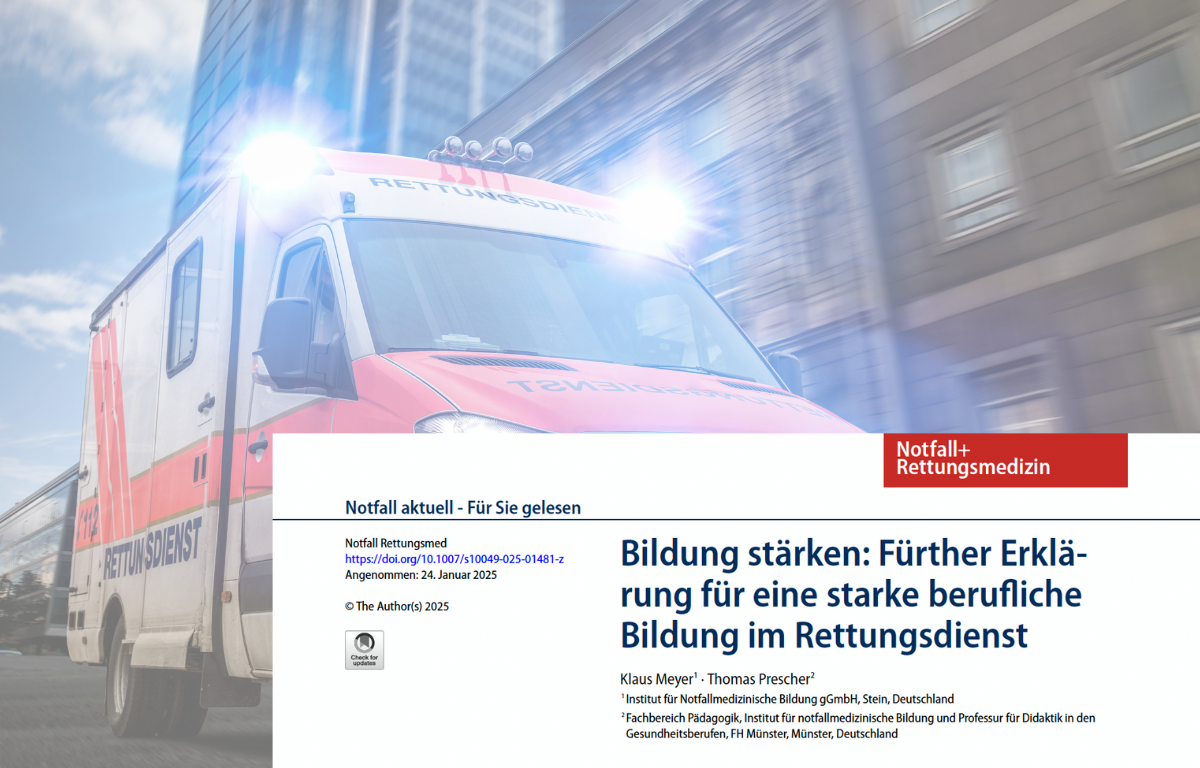
24. February 2025
Publication of the Fürth Declaration
The declaration on strengthening vocational training adopted during the Fürth Talks 2024, which were organized by the Institute for Emergency Medical Education, was published in the specialist journal 'Notfall + Rettungsmedizin'.The Fürth Declaration, a joint declaration for strong vocational training in the emergency services, aims to establish uniform standards and sustainably improve the quality of training in the emergency services. The aim is to initiate a sustainable and nationally coordinated training strategy in the emergency services.
The Fürth Declaration was adopted as part of the Fürth Talks 2024 organized by the Institute for Emergency Medicine Education (INOB). The Fürth Talks are a recurring expert forum that brings together representatives from universities, vocational schools, associations and funding bodies.
The groundbreaking declaration was created against the backdrop of the considerable challenges facing vocational education and training: from different training standards to a lack of uniform examination requirements and a lack of consistency in qualifications. These impede the mobility of skilled workers and lead to uncertainty among trainees and employers.
Patient safety and the efficiency of the rescue service can be improved through standardized training quality as well as the professional competence of emergency paramedics. Particularly in view of an ageing society, rising emergency numbers and increasingly complex deployment scenarios, well-founded training geared towards real care needs is also required.
The full article on the Fürth Declaration has now been published in the specialist journal ‘Notfall + Rettungsmedizin’.
The key points agreed in the agreement are already being actively prepared by the signatories. The results will be presented to a specialist audience at the first congress for vocational training in the emergency services, which will take place in Fürth on March 27 and 28. Further information and the opportunity to register can be found at www.bildungskongress-rettungsdienst.de.

20. February 2025
First ERC course phase in Albania successfully completed
An international team of instructors trained medical professionals in Albania on advanced resuscitation measures and emergency patient care.In cooperation with our partner Swiss Foundation for Innovation (SFI) and funded by the Gesellschaft für internationale Zusammenarbeit (GIZ) in the Clinic Partnerships program, the AGNF conducted ERC courses in Albania in an initial course phase.
During the two-week course phase, an international team of instructors from Romania, Tunisia and Germany led by Diana Cimpoesu, Helene Papaspyrou and Klaus Meyer was deployed. During the first week, Albanian doctors, ambulance staff and nurses were trained in ERC Advanced Life Support (ALS) courses. A Generic Instructor Course (GIC) was also held, in which experienced instructors were given further training to enable them to run courses independently, train new instructors and optimize the quality of training. In the second week of the course, they were able to conduct their first Basic Life Support (BLS) and Immediate Life Support (ILS) courses.
In total, they were able to train almost 60 ALS providers and 4 local ALS instructors.
Our Albanian partner, which is located in the immediate vicinity of the capital Tirana, offers very good conditions and training materials.
The aim is to offer further ALS and GIC courses in the course of the year in order to be able to train a course director and further instructors locally.
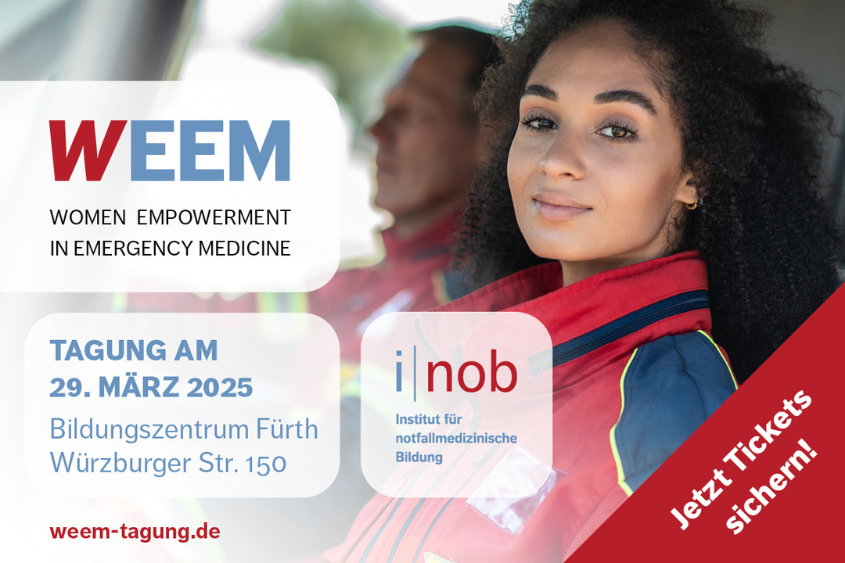
10. January 2025
Conference “WEEM – Women Empowerment in Emergency Medicine”
WEEM is aimed in particular at women working in acute, emergency and intensive care medicine. In addition to exciting workshops and lectures, it offers the opportunity to build and expand an interdisciplinary network and demonstrates strategies for professional development.The Department of Emergency Medicine of the Institute for Emergency Medical Education (INOB) is organizing the first conference “WEEM – Women Empowerment in Emergency Medicine” on 29.03.2025 in Fürth. Detailed information, the program and tickets for the event can now be found at weem-tagung.de.
The AGNF is a partner of the event, which promotes the professional development of women in particular and offers them a platform for interdisciplinary exchange and networking. This is because women are comparatively rarely found in management positions in acute, intensive and emergency medicine, although their skills and perspectives are a great asset and they are a mainstay of high-quality medical care. Especially in a field of work that is affected by a shortage of specialists, strong communication skills, resilience and empathy are important key qualifications – qualities that are valuable regardless of gender. At the same time, the event is aimed at all professionals who are looking to exchange ideas with colleagues, advance their careers or share experiences they have already gained. With practical workshops and presentations by inspiring female speakers on topics such as public speaking, confident presentation, legal and financial basics and career planning, the conference program covers a broad spectrum. The special challenges for women in management positions are taken into account as well as general strategies for professional development. The exchange with experienced managers also enables the development of an interdisciplinary network that creates valuable connections beyond one’s own specialist area. This event is aimed at anyone who wants to actively shape their professional development and benefit from an interprofessional network – women are the focus, but all genders are equally welcome. Further information can be found at weem-tagung.de.


3. January 2025
Congress on education in the emergency services
A varied program with top-class speakers awaits visitors to the 1st Rescue Service Education Congress on 27 + 28 March 2025 in the Stadthalle Fürth.Together with S+K Verlag, the Institute for Emergency Medical Education (INOB) is organizing the “Education in the Emergency Services” congress for the first time from 27-28 March 2025 in the Stadthalle Fürth. The program and speakers have now been confirmed. Tickets are now available.
The congress offers educational stakeholders from rescue service practice, vocational schools, universities and associations the opportunity to jointly examine the challenges and opportunities of rescue service education. Key topics include the three-year training course for emergency paramedics, interprofessional collaboration, intersectoral emergency care and the ongoing debate about academization. The didactic challenges, innovative approaches and concrete ideas for practical solutions will be highlighted. Renowned experts and practitioners will present current findings and best practices in lectures, workshops and panel discussions. The event is aimed at teachers, practical instructors, university lecturers and school administrators, as well as anyone who would like to help shape future-oriented emergency services education.
Together we are shaping the future of training and further education in the emergency services!
You can expect inspiring insights into the adaptation of educational quality and curricula to the requirements of a dynamic field of work and practical impulses such as educational and training methods that can be applied in your organization. In addition, the congress offers a networking and exchange opportunity where you can learn from and with colleagues who are dealing with key issues in emergency services education and training – make valuable contacts and exchange ideas. Further information can be found at bildungskongress-rettungsdienst.de. Tickets are available via the S+K Verlag ticket portal.

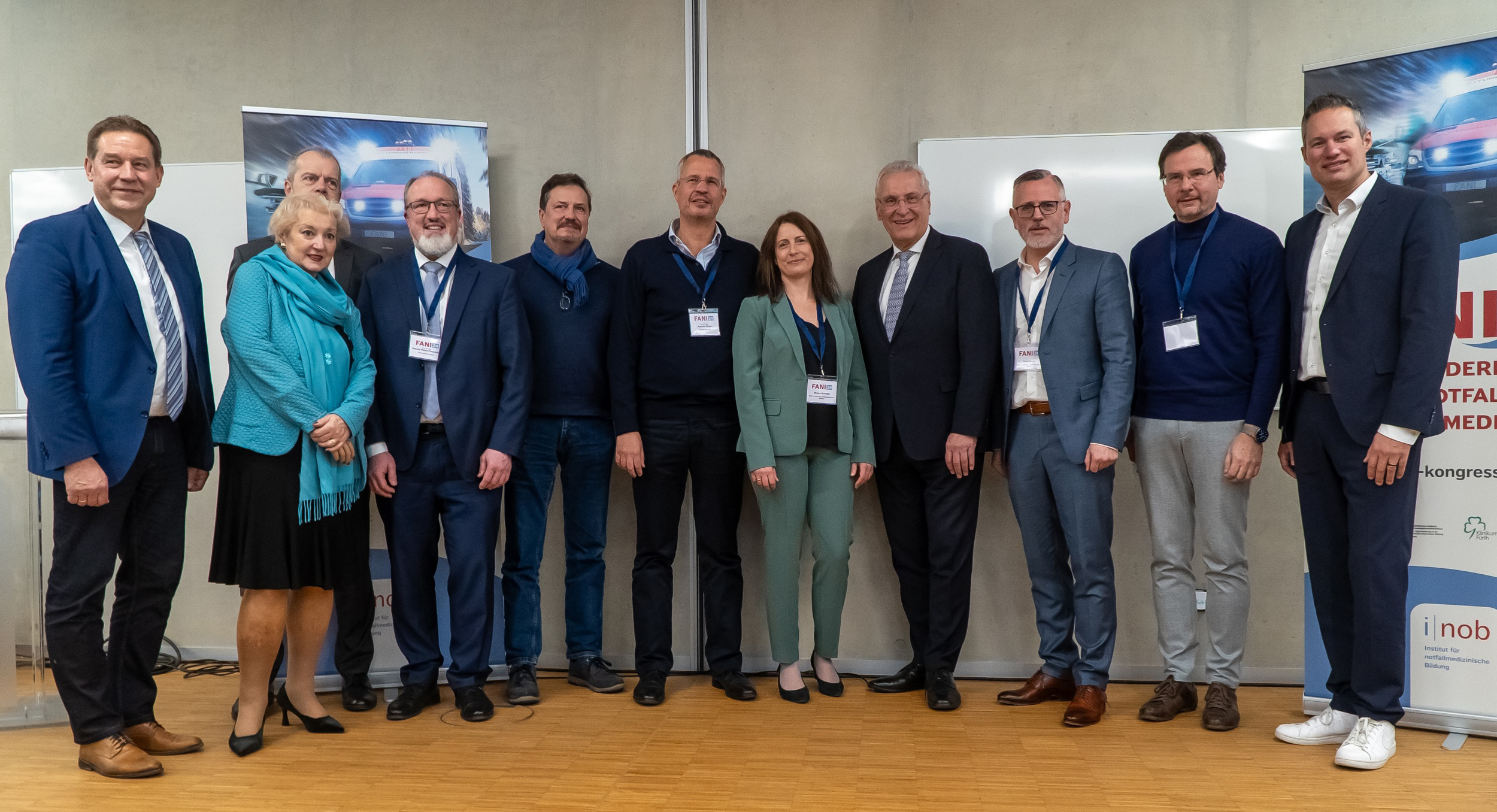
16. December 2024
FANI’24 – Franconian derby for acute, emergency and intensive care medicine
The Franconian derby of acute, emergency and intensive care medicine - FANI'24 - took place for the first time on December 13 + 14, 2024. Patron Minister of the Interior Joachim Herrmann opened the event.The first ever Franconian derby for acute, emergency and intensive care medicine – FANI’24 – was officially opened on Friday lunchtime. Patron Interior Minister Joachim Herrmann welcomed the participants on site at the SRH Wilhelm Löhe University of Applied Sciences in Fürth.
The FANI is organized by the Institute for Emergency Medical Education (INOB), which organized the congress together with its cooperation partners Klinikum Nürnberg, Klinikum Fürth, Arbeitsgemeinschaft Notfallmedizin Fürth e. V. and Technologietransferzentrum Stein der Hochschule Ansbach. Around 100 top-class expert lectures and several workshops took place until Saturday, which were embedded in a colorful supporting program with Medic Slams and an action area of the Bavarian Red Cross on the Xylokastroplatz. Joachim Herrmann, Bavarian State Minister of the Interior, for Sport and Integration, MdL, emphasized in his welcoming address: “Comprehensive and high-quality emergency medical care for our Bavarian population is very important to me personally. In order to further strengthen Bavaria’s leading role, events and discussion formats that enable an exchange between the various parties involved are of crucial importance. Around 400 experts from acute, emergency and intensive care medicine came together in Fürth for the very first edition of the congress. Klaus Meyer, Managing Director and Director of the INOB, is delighted with the great response: “With the FANI, we want to offer experts from the region and beyond a platform for exchanging knowledge and networking. We have deliberately put together a program that is equally interesting for doctors, nursing staff and emergency services personnel. The great response shows that we are on the right track with this format. After opening with workshops in small groups on topics such as neonatal emergencies, echocardiography and ventilation, the focus was then on lectures and discussions covering a wide range of topics from resuscitation, emergency care and infectiology to emergency reform and interdisciplinary intensive care medicine. In March, the “Education in Emergency Services” congress and the “WEEM – Women Empowerment in Emergency Medicine” conference will be two further new INOB formats. A new edition of the FANI in 2025 is also being considered. Photo: Pixel Campus Ansbach University of Applied Sciences from left to right: Markus Braun (Mayor of Fürth), Petra Guttenberger (Member of the State Parliament, Deputy Chair of the Emergency Medicine Working Group Fürth e.V.), Clemens Werkmeister (President of SRH Wilhelm Löhe University of Applied Sciences), Prof. Dr. Sascha Müller-Feuerstein (President of Ansbach University of Applied Sciences, Scientific Director of INOB), Dr. Frank Sinning (Medical Director of the Emergency Medicine Working Group Fürth e. V.), Prof. Dr. Sascha Müller-Feuerstein (President of Ansbach University of Applied Sciences, Scientific Director of INOB).V.), Prof. Dr. Joachim Ficker (Chief Physician Internal Medicine at Nuremberg Hospital), Mirjam Schmidt (Director INOB), Minister of the Interior Joachim Herrmann, Klaus Meyer (Director INOB, Chairman of the Board of the Emergency Medicine Working Group Fürth e.V.), Prof. Dr. med. Harald Dormann (Scientific Director INOB, Chief Physician Central Emergency Department Klinikum Fürth), Dr. Alexander Mohr (Board of Directors Klinikum Fürth)

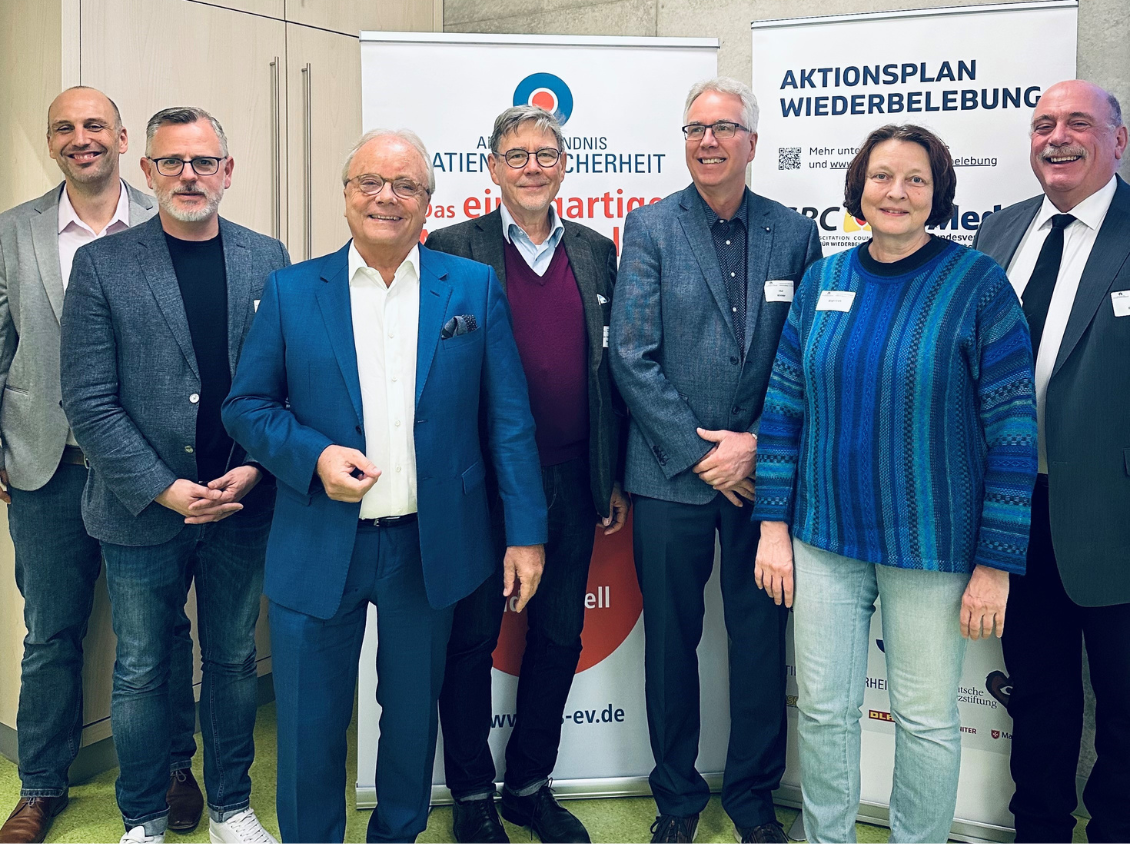
3. December 2024
Expert panel of the Patient Safety Action Alliance on the resuscitation action plan
In cooperation with the German Medical Technology Association (BVMed) and the German Resuscitation Council (GCR), the Patient Safety Action Alliance organized a panel of experts on the topic of the Resuscitation Action Plan in mid-November.The experts are calling for a reliable legal framework for lay resuscitation as a key component in saving lives. Among them was Klaus Meyer, Chairman of the AGNF Board, who presented FÜRTH SCHOCKT! as an example of a regional initiative for the comprehensive installation of publicly accessible AEDs and the alerting of trained first aiders. At their meeting at Nuremberg Hospital, the expert panel for the implementation of the National Action Plan for Resuscitation once again emphasized the central importance of lay resuscitation and its establishment in the population. The 3 big H’s (Main thing: vigorous cardiac massage) and the rule of thumb Check – Call – Push must be anchored in the minds of the population so that help can be provided in an emergency and the number of around 10,000 people who die unnecessarily from sudden cardiac death every year can be reduced. The Aktionsbündnis Patientensicherheit is an association of representatives of the healthcare professions, their associations, patient organizations as well as industry and business in order to establish a joint platform for improving patient safety in Germany. The Action Alliance was founded in 2005 as a non-profit association.
The central topics are safe healthcare and the research, development and dissemination of suitable methods for this. Patient information and recommendations for action are produced on a voluntary basis by practitioners for practitioners. Photo: © Aktionsbündnis Patientensicherheit
From left to right:
Dr. Christian Engelen, Klaus Meyer, Univ.-Prof. Dr. Bernd W. Böttiger, Dr. Christian Deindl, Olaf Winkler, Birgit Kraft, Klaus Friedrich

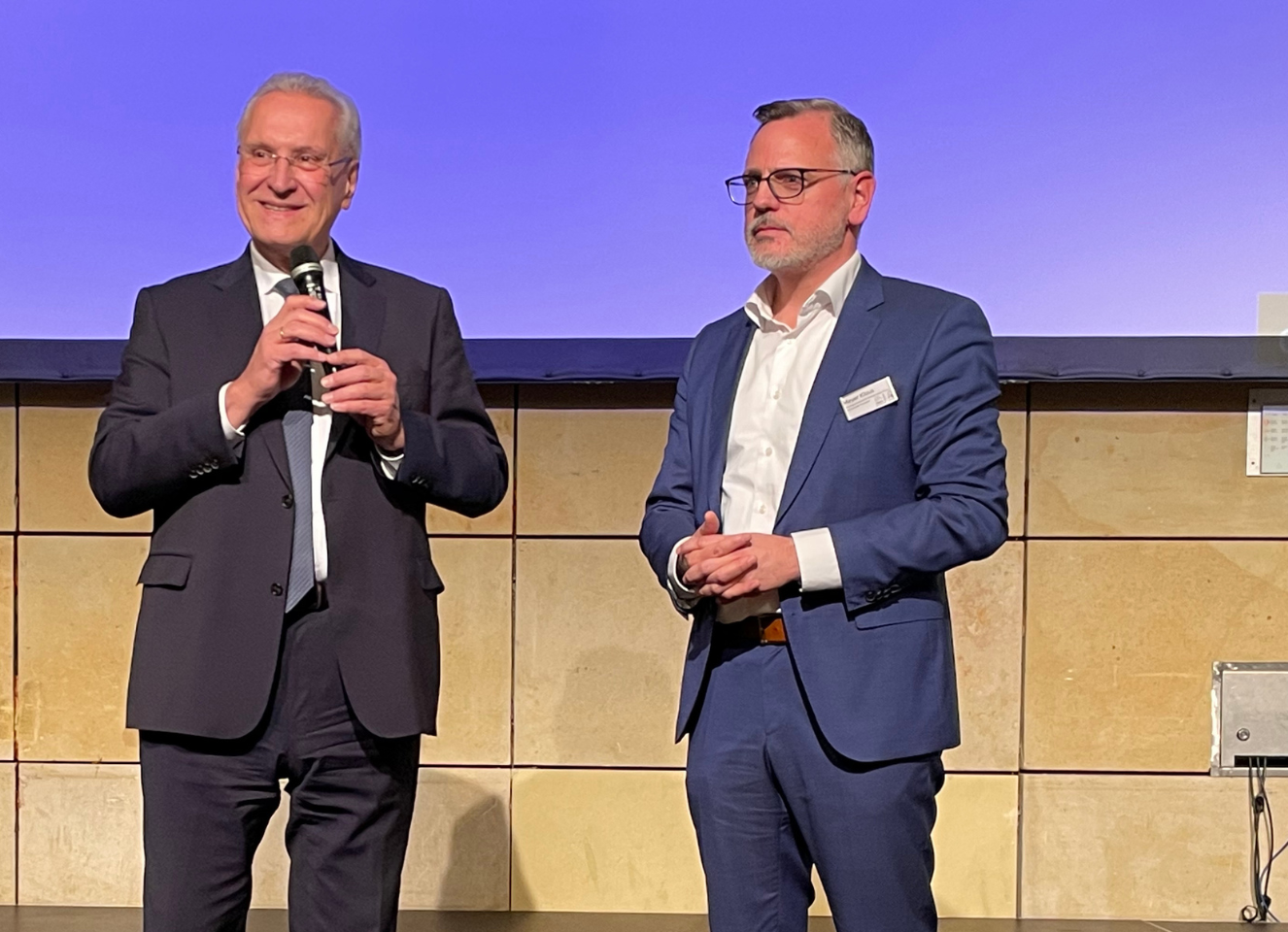
25. November 2024
AGNF promotes the Bavaria-wide establishment of systems for activating first aiders in the event of sudden cardiac death
Numerous high-profile guests were invited to the information and discussion event "Combating sudden cardiac death - strengthening cities and districts". Among them Minister of the Interior Joachim Herrmann and CSU parliamentary group chairman Klaus Holetschek.The Fürth Emergency Medicine Working Group (AGNF) hosted the event “Combating Sudden Cardiac Death – Strengthening Cities and Counties” on Wednesday, November 20, 2024, at the Fürth Town Hall. In addition to best-practice examples, app-based first responder alerting systems were presented. Interior Minister Joachim Herrmann and CSU parliamentary group chairman Klaus Holetschek provided political support for the format.
Klaus Meyer, Chairman of the Board of the Fürth Emergency Medicine Working Group, presented the FÜRTH SCHOCKT! initiative in his opening speech: “Within a short space of time, we have succeeded in establishing a network of first responders in the city and district of Fürth who are alerted via smartphone in the event of sudden cardiac death. At the same time, we pushed ahead with the installation of 24/7 accessible AEDs and were able to shorten the treatment-free interval until the arrival of the emergency services by the crucial minutes in numerous cases – and thus save lives.”
Every year, around 70,000 people die from sudden cardiac death nationwide, of which around 10,000 could survive if first aid was administered in time.
“We are therefore delighted that we are now able to implement our concept in other parts of the region with ERLANGEN SCHOCKT! and NÜRNBERGER LAND SCHOCKT!”, added Klaus Meyer.
Angelika Lange, Senior Impact and Project Manager at the ADAC Foundation, then presented the results of the study “Potential analysis for first responder alerting systems”. According to the survey, 79% of respondents in the population were not aware of first aid apps. However, 16% would be willing to register as first responders after the concept was explained to them.
In the survey, 40% of the control centers that receive emergency calls from the rescue services stated that they already use a first responder alerting system. 60% of those who did not yet have a system planned to introduce one within the next three years.
However, the study also highlighted the hurdles involved. The control centers cited a lack of legal foundations, funding difficulties and a lack of personnel as the biggest obstacles to the introduction of such systems.
Fortunately, the number of control centers using app-based first responder alerting has already continued to rise since the study was conducted in June 2024.
This trend was underlined by Klaus Holetschek, CSU parliamentary group leader and former Minister of State for Health and Care. As patron of the initiative to alert first responders in the Donau-Iller and Allgäu regions, he was able to report first-hand that, to his great delight, more and more people are becoming active as first responders.
Joachim Herrmann, Minister of the Interior, Sport and Integration, MdL, who is the patron of the event and the FÜRTH SCHOCKT! project, was proud of what has already been achieved: “Thanks to the project, 212 defibrillators are now registered in the system in Fürth and the surrounding area” and added: “The Free State of Bavaria recently extended the funding for such defibrillators until the end of 2026 and increased the budget for the granting authorities by 350,000 euros.”
Apps that recognize which first responders are in the vicinity of the scene and show them the shortest route to the nearest defibrillator and the scene of the incident are central to alerting first responders as quickly as possible. Active in Bavaria are the app providers TEAM BAYERN Lebensretter and Region der Lebensretter e.V. as well as Mobile Retter e.V. as a service provider for the associated project organization.
Christopher Glas, head of the TEAM BAYERN app run by the Bavarian Red Cross, emphasized that his system is used to raise the alarm in both disaster and emergency situations. In the TEAM BAYERN lifesaving sub-area, for example, helpers are alerted via the control centre in the event of cardiovascular arrest and can provide additional assistance in an emergency – across all aid organizations, of course.
Stefan Prasse, Managing Director of Mobile Retter e.V., emphasized the importance of good project organization in parallel with the introduction of an alerting app. The association not only supports the introduction of an app, but also the recruitment and support of volunteer first aiders.
Prof. Dr. Michael Müller, 1st Chairman of Region der Lebensretter e.V., reported on the ongoing development of the lifesaver app, which is already being used in 66 local authorities across Germany and can draw on a network of almost 22,000 first aiders. By optimizing the calculation of the route, the time to arrival of the first responders could be further reduced.
In the concluding discussions and networking talks, important contacts were made that will hopefully bring us closer to the goal of establishing systems throughout Bavaria to activate first aiders in the event of sudden cardiac death.
The representatives of the Healthy Regions Plus, aid organizations, rescue associations and control centres in attendance certainly made good use of the opportunity to exchange ideas with doctors, politicians and scientists.

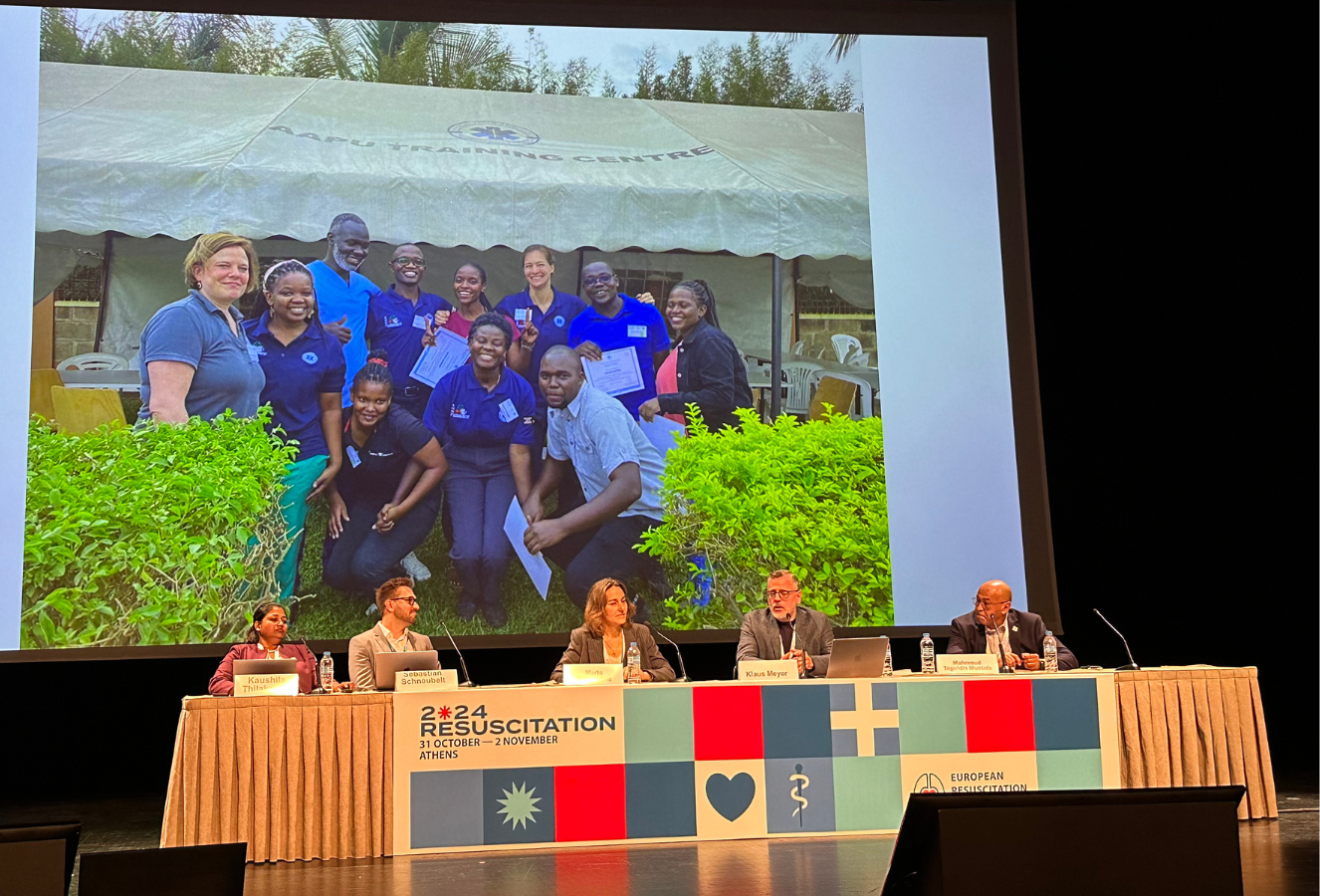
6. November 2024
Visit to the ERC conference in Athens
A Ugandan and an AGNF delegation traveled to the ERC conference in Athens. The AGNF organized a round table there and supported the Ugandan colleagues on their way to a seat on the ERC.From 30.10.-03.11.2024, an AGNF delegation attended the ERC (European Resuscitation Council) conference in Athens. Among other things, we supported our partners from Uganda on their way to establishing a national resuscitation council recognized and supported by the ERC. The successful establishment of the ERC courses on emergency medical care for adults, children and newborns as part of GIZ’s clinic partnership support was essential for the introduction of standardized emergency care in Uganda. Our partner in Uganda, the AAPU training center, is now able to offer the internationally recognized and certified course formats Advanced Life Support (ALS), European Pediatric Advanced Life Support (EPALS) and Newborn Life Support (NLS) as well as other low-threshold course programs in Uganda and to train medical staff professionally and to a very high standard. A Ugandan National Resuscitation Council needs to be established in order to harmonize course standards in the country. This will enable Uganda to be permanently and institutionally linked to the ERC as the central professional association for resuscitation and the care of the critically ill, together with its scientific and educational international network. Officially, the ERC awards five seats to non-European countries that are part of the ERC and thus have the right to participate in the development of international standards. Last but not least, they are also supported in research topics.
Four of the five seats have already been allocated, Uganda has submitted a request for the fifth seat.
For this reason, the Ugandan presence at the ERC conference in Athens was indispensable.
The delegation from Uganda represented both the Ugandan Ministry of Health and our long-standing project partner, the Association of Ambulance Professionals Uganda (AAPU). This meant that central functions such as first chairman, assistant to the board, head of the training department, secretary general and international relations of the newly founded Ugandan Council for Resuscitation were present. A few weeks before the conference, the Ugandan Resuscitation Council submitted its concept note and thus the request for partnership with the ERC. This request was not only very well received by all medical associations in the country, but the project was also supported by the Ugandan Ministry of Health. During the conference, a first personal and very positive exchange took place with the ERC leadership group. The ERC gave Uganda the green light for the application and expressed great interest in a partnership and future collaboration. We expect to be able to congratulate our Ugandan colleagues on this great success within the next few months! Organized by the AGNF, the “low-income” countries present at the conference were also invited to a “Table Discussion”. Tunisia, Sri Lanka, Sudan and Egypt were present and were able to exchange experiences and make further contacts. In addition to the valuable exchange at the conference, the many exciting discussions and interesting presentations, we were able to use the opportunity to structure the tasks of the Ugandan Council for Revitalization and plan further projects.

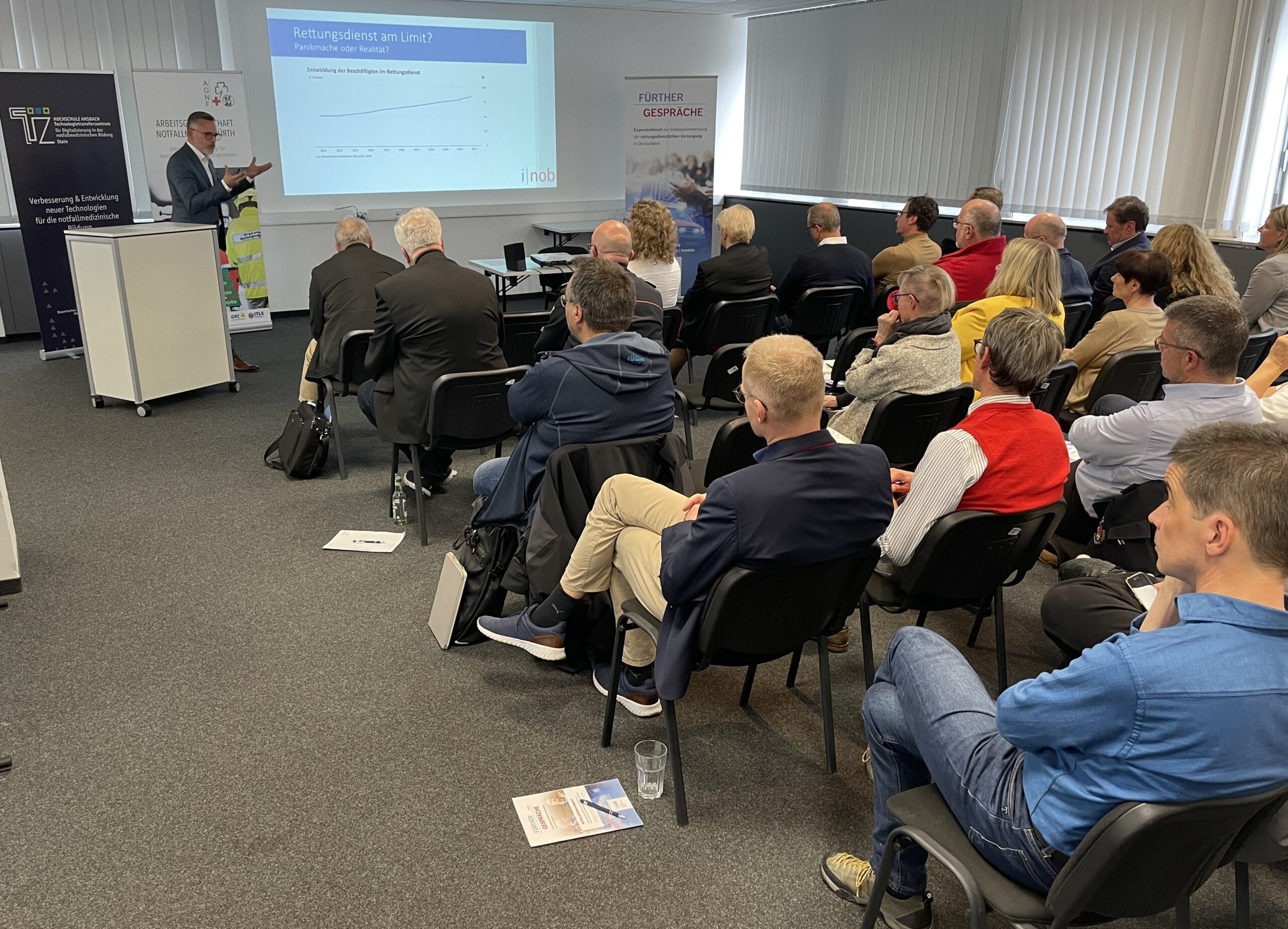
24. October 2024
Expert discussion on the local and regional impact of the emergency reform
The results of the 2nd edition of the Fürth Talks were discussed in the context of the emergency reform and its impact on the region.On October 19, the AGNF and the Institute for Emergency Medical Education (INOB) invited participants to discuss the results of the 2nd edition of the expert forum and think tank Fürther Gespräche, which this year focused on the rescue service and its networking with emergency care in hospitals, in the context of the emergency reform and its effects on the region. The framework for the discussion was provided by expert presentations, which took up the contents of the results paper of the 2nd Fürth Talks, which were organized in spring by the Institute for Emergency Medicine Education (INOB), the Emergency Medicine Fürth Working Group (AGNF) and Ansbach University of Applied Sciences.
The results paper is available for download at https://inob.org/fuerther-gespraeche-2024/. Prof. Dr. Christian K. Lackner, Chairman of the Claus Enneker Foundation, kicked off the event with a presentation on the fundamental need for reform and the consequences of reform in emergency and acute medicine. He took a look at other countries and pilot projects that could serve as a model for our healthcare system.
He was followed by Prof. Dr. Harald Dormann, Chief Physician of the Central Emergency Department at Fürth Hospital and Scientific Director at INOB, who described the hospital and emergency reform at the sector transition, focusing in particular on the region and its hospitals. He emphasized that there is a need for reform in the qualification system and in the possibilities for case-closing treatment outside the clinics. After Klaus Meyer, Chairman of the AGNF Board of Directors and Managing Director of INOB, had described the current situation in the ambulance service, the complexity and controversial nature of the topic quickly became clear in the first round of discussions that followed. “The dynamics of the discussions show that with our recommendations for action and the chosen format with open discussion rounds, we have hit a point that concerns and interests politicians at local, state and federal level as well as representatives of the healthcare sector,” said Klaus Meyer, pleased with the lively exchange. For example, Tobias Winkler (Member of Parliament), Carsten Träger (Member of Parliament), Petra Guttenberger (Member of Parliament), Bernd Obst (District Administrator of Fürth), Markus Braun (Mayor of Fürth), Kurt Krömer (First Mayor of Stein), Gökhan Katipoglu (Head of Emergency Services, KV Bayern), Stefan Kornhaas (Head of Rescue Services, BRK Fürth), Dr. Manfred Wagner (Medical Director, Fürth Hospital) and Prof. Dr. Sascha Müller-Feuerstein (President of Ansbach University of Applied Sciences) took part in the event. The challenges of the integrated control center at the Nuremberg fire department were then highlighted by its department head and chairman of the control center association, Marc Gistrichovsky. Under the vision of “One Call fits All”, he presented optimization options such as an upstream online self-assessment for patients, synchronized query systems and the exchange of health data between the 112 and 116117 numbers. In the concluding discussion round, for example, questions from politicians were answered and their impulses and experiences from everyday life in the region were taken on board. We would like to thank everyone for their great interest and the lively discussion!


14. October 2024
Visit by a Ugandan delegation
We have been active in Uganda for several years now and work closely with local partners. During a visit by a Ugandan delegation to Germany, the focus was on quality management and control.A Ugandan delegation from the Ministry of Health and the Association of Ambulance Professionals Uganda (AAPU) visited Germany from October 6-12, 2024. The focus was on quality management and control. In November 2021, the Ugandan EMS policy (Emergency Medical Services) and the associated strategy for implementing the specified standards, SOPs and algorithms were adopted. As a result, the Ugandan Ministry of Health, led by the Emergency Medical Services Department, has been assigned far-reaching tasks in the area of quality management and control for emergency medical services.
Due to a lack of personnel capacity and the fact that the Ministry of Health is still developing specialist skills, the Ugandan Ministry of Health would like to transfer this trustworthy task to the AAPU, which has already been providing support for many years. The key questions here are:
-How can this transfer succeed?
-What structures need to be created for this?
-How can quality assurance and control tasks be carried out?
The two-person Ugandan delegation, consisting of the Commissioner of the Ministry of Health and the representative of the AAPU President, discussed these issues with us and partners from our network in Switzerland. In the Swiss rescue service system, the respective cantons are responsible and have also outsourced the area of certification and quality assurance to a professional association, the IVR Interverband Rettungswesen. As this best-practice example could serve as a blueprint for Uganda, the exchange with the Swiss colleagues was very exciting for the Ugandan delegation. In addition to the stay at the Interverband Rettungsdienst in Lucerne, the delegation visited
-the Bavarian Ministry of the Interior in Munich with a presentation on the main features of the rescue service in Bavaria with a focus on quality management and quality assurance
-the INM – Institute for Emergency Medicine and Medical Controlling at LMU, with a scientific focus on determining the location of rescue resources and their evaluation
-the BRK regional association, as the largest rescue service provider in Bavaria
-as well as the state fire department school in Geretsried, which is responsible for the qualification of managers in disaster control. A visit to the integrated control center in Nuremberg, a Malteser rescue station and the bildung37° education center rounded off the stay. The Ugandan delegation set off on their return journey with plenty of ideas and inspiration to put the knowledge gained into practice at home.

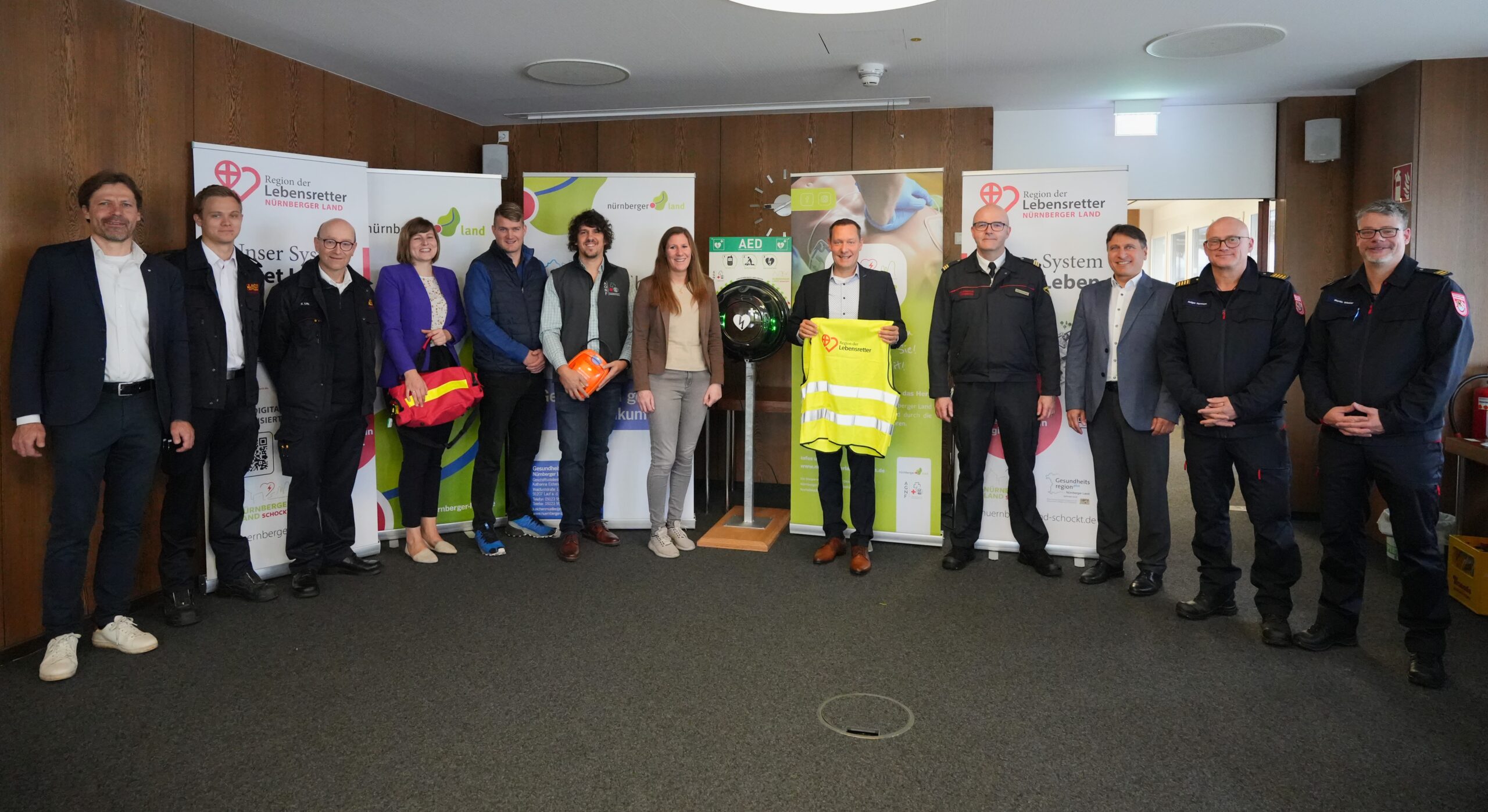
11. October 2024
The Nuremberg region is now a region of lifesavers
An important milestone for our project NÜRNBERGER LAND SCHOCKT! The Nuremberg region is now officially a region of lifesavers!On October 7, the alerting area within the integrated control center of the Nuremberg fire department was expanded to include the Nuremberg region. This means that first responders are alerted directly to sudden cardiac arrest emergencies in their area via the Lifesavers’ Region app and can bridge the time window until the emergency services arrive. In order to be able to help as efficiently as possible, the expansion of the network of publicly accessible AEDs is also part of our project NURNBERGER LAND SCHOCKT! Together with GesundheitsregionPlus Nürnberger Land, headed by Katharina Eichenmüller, District Administrator Armin Kroder and Marc Gistrichovsky from the ILS, we were able to give the go-ahead.
The project is supported by the local aid organizations, above all the Nuremberg County Association of the Bavarian Red Cross, the Jura and Nuremberg County Regional Associations of the Arbeiter Samariter Bund, the Nuremberg County Fire Brigade Association, Rummelsberg Hospital and the Nuremberg County Hospitals.
We are delighted to have so much support and hope to be able to save many lives together! Further information on the project and the opportunities to get involved as an AED sponsor or first aider can be found at nuernbergerland-schockt.de.

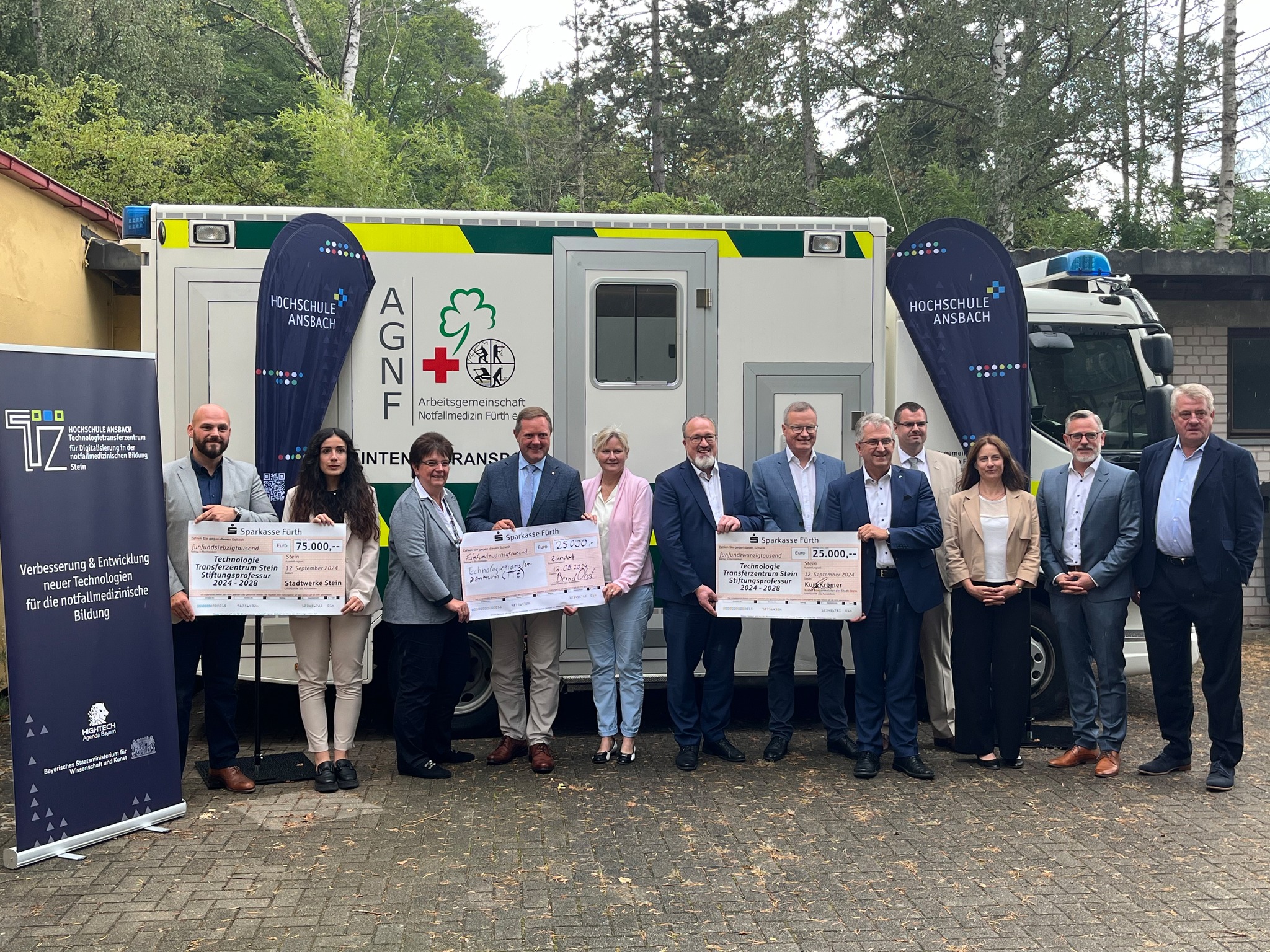
16. September 2024
Endowed professorship at the Technology Transfer Center (TTZ)
The Fürth District Foundation, the town of Stein and the Stein public utility company have presented Ansbach University of Applied Sciences with a donation for the endowed professorship at the Technology Transfer Center (TTZ).On September 12, 2024, an important milestone was reached for the endowed professorship, which will take over the scientific management of the TTZ and thus further strengthen its innovative power and research expertise.
The foundation of the district of Fürth, the city of Stein and Stadtwerke Stein presented the donation to Ansbach University of Applied Sciences.
The TTZ Stein is working on improving training in emergency medicine, rescue services and hazard prevention with the help of digital technologies.
The research focuses on the use of virtual reality (VR) / augmented reality (AR), simulation and artificial intelligence (AI).
In cooperation with local companies, a supra-regional competence center for digital emergency medical education is to be created.
“The Board of Trustees of our district foundation has decided to provide the technology transfer center with a total amount of 25,000 euros. We assume that the TTZ will have a positive impact not only on Stein, but on the entire district, and we look forward to making the technology transfer center a success, also with the support of the district foundation,” said District Administrator Bernd Obst.
“For the town of Stein, the Stein Technology Transfer Center is an important facility on the future educational and cultural campus at Deutenbacher Straße 1 in Stein,” adds Stein’s First Mayor Kurt Krömer.
“From Stein, applied research will support emergency medicine in the future and thus save lives.”
In addition to the Fürth District Foundation and the town of Stein, other regional organizations and companies have also contributed to the funding of the endowed professorship.
These include Fürth Hospital, the Bavarian Red Cross, the Red Cross Foundation Fürth, the BRK – Regensburg Red Cross Foundation, Stadtwerke Stein, entrepreneur Thomas Sommer and ourselves.
As part of the Hightech Agenda, the Free State of Bavaria is funding the TTZ Stein with over five million euros, while the city of Stein is providing the premises.
The press release with all the details can be downloaded here: Press release. Photo from left to right: Sebastian Habicht (Management TTZ Stein), Luisa Lochschmidt (Stadtwerke Stein), Renate Krach (Stiftungsrat Landkreisstiftung Fürth), District Administrator Bernd Obst (Landkreis Fürth / Landkreisstiftung), Evelyn Meyer (Stiftungsrat Landkreisstiftung Fürth), Prof. Dr.-Ing Sascha Müller-Feuerstein (President Ansbach University of Applied Sciences), Sebastian Lange (Bavarian Red Cross Rescue Service Department), First Mayor Kurt Krömer (City of Stein), Johannes Gottschalk (BRK – Regensburg Red Cross Foundation), Mirjam Schmidt (Fürth Hospital), Klaus Meyer (Chairman of the AGNF Board), Thomas Sommer (Entrepreneur) Photo: Mauritius Scheutz

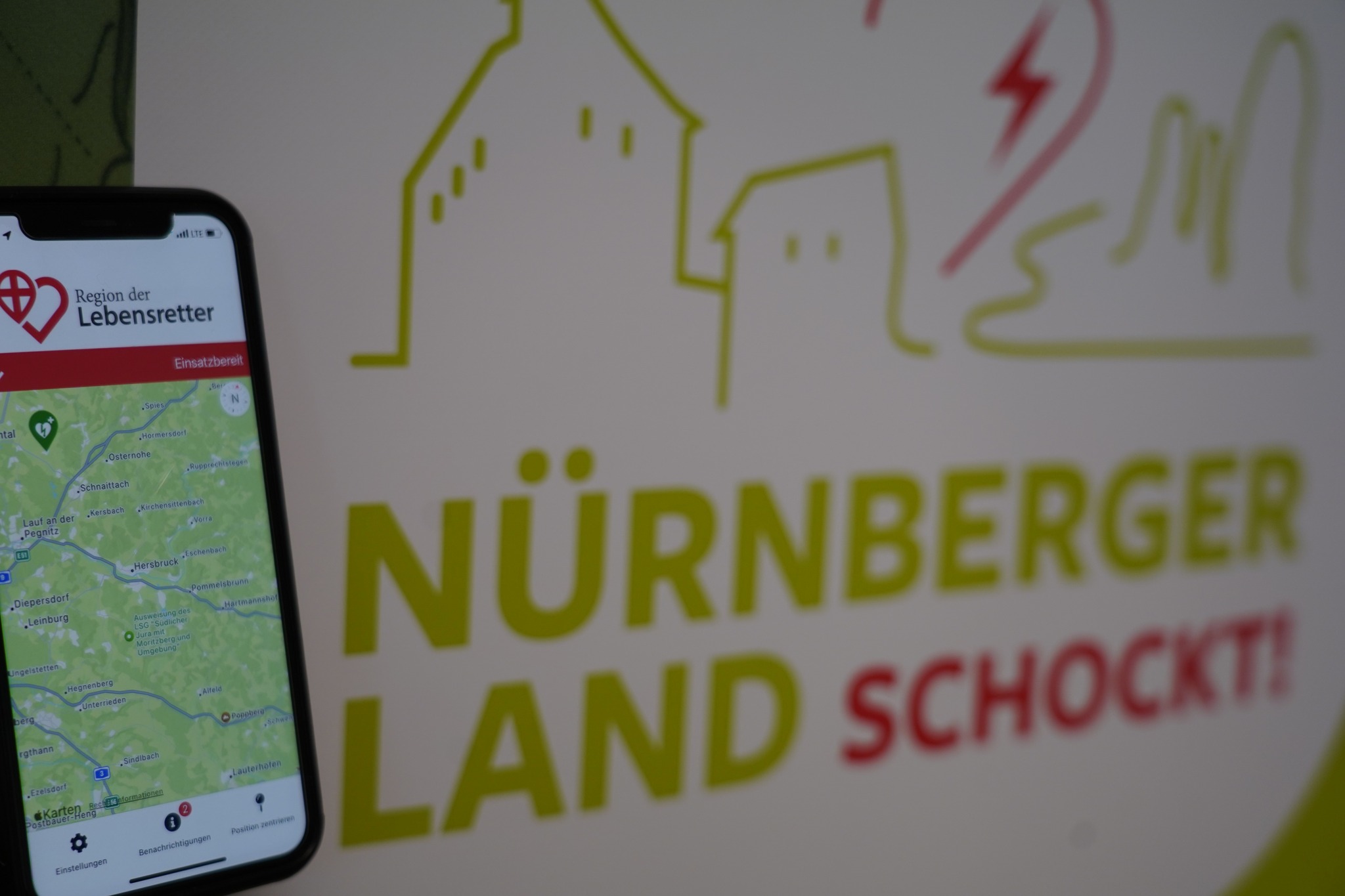
4. September 2024
NÜRNBERGER LAND SCHOCKT! starts, ERLANGEN SCHOCKT! successfully established, FÜRTH SCHOCKT! celebrates anniversary
Large parts of the Nuremberg control center area are now part of our initiative and the Region of Lifesavers. The Nuremberg region is a new addition.We are very pleased about the launch of NÜRNBERGER LAND SCHOCKT! NÜRNBERGER LAND SCHOCKT! aims to improve the chances of survival after a cardiovascular arrest in the Nuremberg region.
To tackle these improvements as part of an overall strategy, NÜRNBERGER LAND SCHOCKT! combines various project modules.
In addition to AED sponsorships, these include the integration of AEDs into an app for first aid alerts and measures to raise awareness of resuscitation.
The relevant medical, first aid and rescue organizations in the Nuremberg region are involved in implementing the project.
FÜRTH SCHOCKT! celebrated an anniversary: the Fürth region has now been an active part of the Region of Lifesavers for a year.
This was duly celebrated with the app participants and cooperation partners.
In the meantime, ERLANGEN SCHOCKT! has successfully established itself.
Around 200 first aiders are now active in the city of Erlangen.
This means that several local authorities in the Nuremberg control center are now part of the initiative, with more to follow.

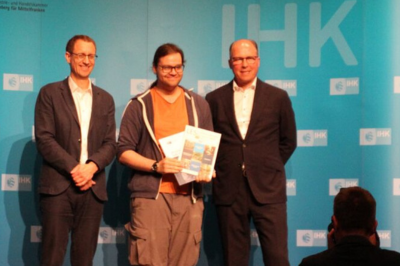
1. August 2024
Awards for Leon Päge
Leon Päge was honored twice by the IHK committee Fürth on July 24 at the Stadthalle Fürth for his outstanding achievements during his training as an office management assistant.Completing your apprenticeship is a milestone in your professional life. Leon Päge, who received two awards for his achievements during his training, will be remembered particularly fondly. Leon joined the team in October 2020 after graduating from high school as part of an FSJ. He obviously liked it here, because after extending his FSJ by six months, he accepted our offer to train as an office management assistant. Leon continued to work for us to bridge the gap until the start of his apprenticeship in September. Due to his particularly good school performance, he was able to shorten his training to 2 years and completed it in summer 2024. And he was more than successful: on 24.07.2024, Leon was not only honored for his outstanding academic achievements, but also awarded the title of best office management assistant by IHK Vice President Hannes Streng and Markus Münchmeier, Deputy Headmaster of the Ludwig Erhard Vocational School in Fürth, by the IHK committee Fürth of the Nuremberg Chamber of Industry and Commerce for Middle Franconia. We are delighted that Leon will be staying with us after completing his training. As an employee in materials management, he ensures the smooth running of our Training and further education offers. He not only assembles consumables, prepares simulation training courses or puts together material orders, Leon is also in demand as an expert for the right material equipment when developing new courses. “I particularly like the opportunity to work independently. I like the mix of routine processes and the constant new challenges,” says Leon, describing his job. “And working in our great team is simply fun!” We can only say that back, dear Leon. Congratulations again on your outstanding achievements. We look forward to working with you in the future!

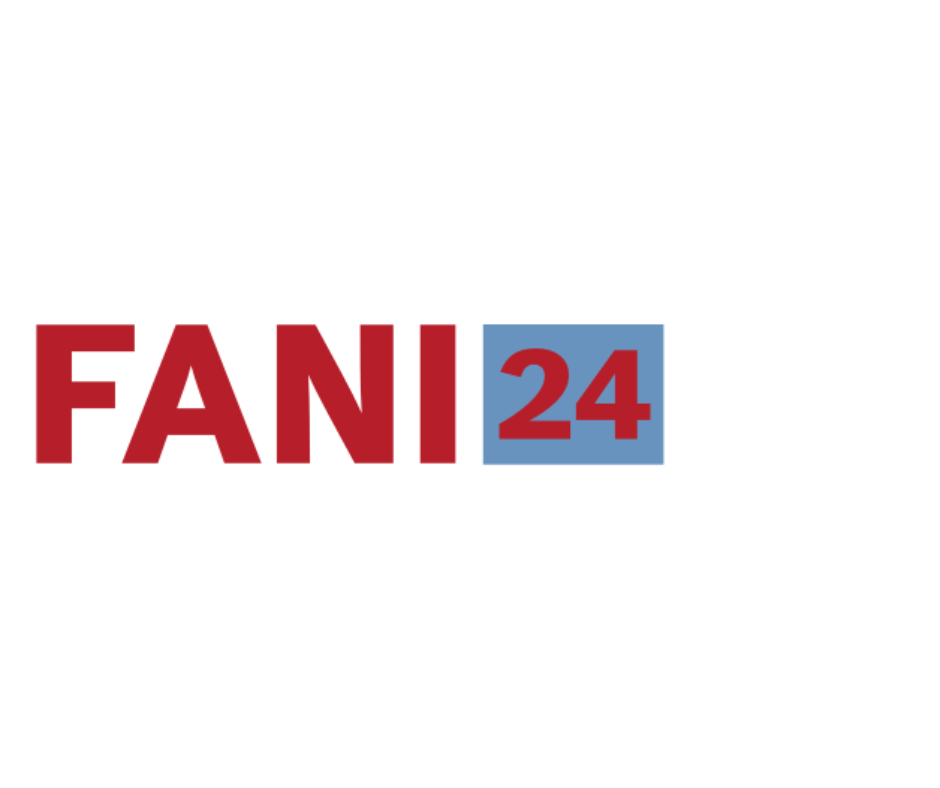
15. July 2024
The AGNF is a cooperation partner of Fani ’24
From 13 - 14.12.2024, the Institute for Emergency Medical Education (INOB) is organizing the congress FANI '24 - Frankenderby der Akut-, Notfall- und Intensivmedizin at the SRH Wilhelm Löhe Hochschule Fürth.We are delighted to be a partner of FANI ’24 – Frankenderby der Akut-, Notfall- und Intensivmedizin together with the Klinikum Fürth, the Klinikum Nürnberg and the Technologietransferzentrum für Digitalisierung in der Notfallmedizinischen Bildung.
The congress will take place from 13 – 14.12.2024 at the SRH Wilhelm Löhe University of Applied Sciences Fürth and is organized by the Institute for Emergency Medical Education (INOB).
The patron of the event is Joachim Herrmann, Bavarian State Minister of the Interior, for Sport and Integration.
The preliminary program is already available at fani-kongress.de and will be updated regularly. Tickets can also be booked directly on the FANI ’24 website.
An extensive range of supplementary workshops will be added shortly.

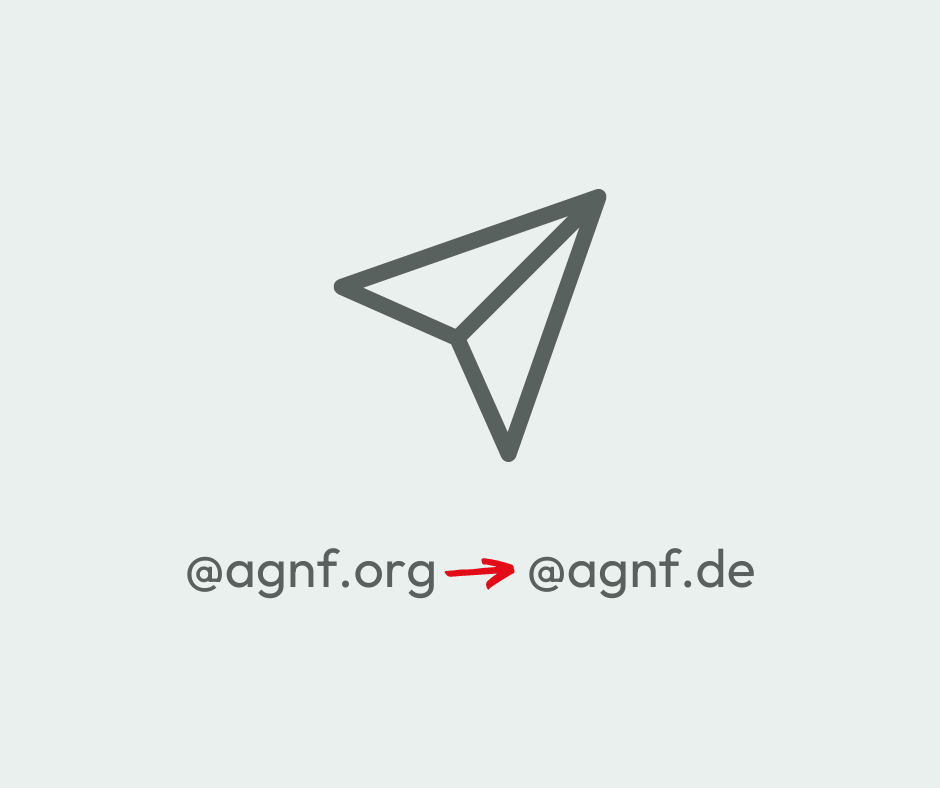
14. July 2024
New e-mail addresses
Following the relaunch of our website at the end of February, which can now be accessed at agnf.de instead of agnf.org, we are now also changing our e-mail addresses.We are changing our e-mail addresses from @agnf.org to @agnf.de.
If you would like to send us an e-mail, please send it to the new @agnf.de address with immediate effect. Of course, you can still reach us via the previous @agnf.org addresses.
However, you will receive e-mails from us from the new addresses with immediate effect.

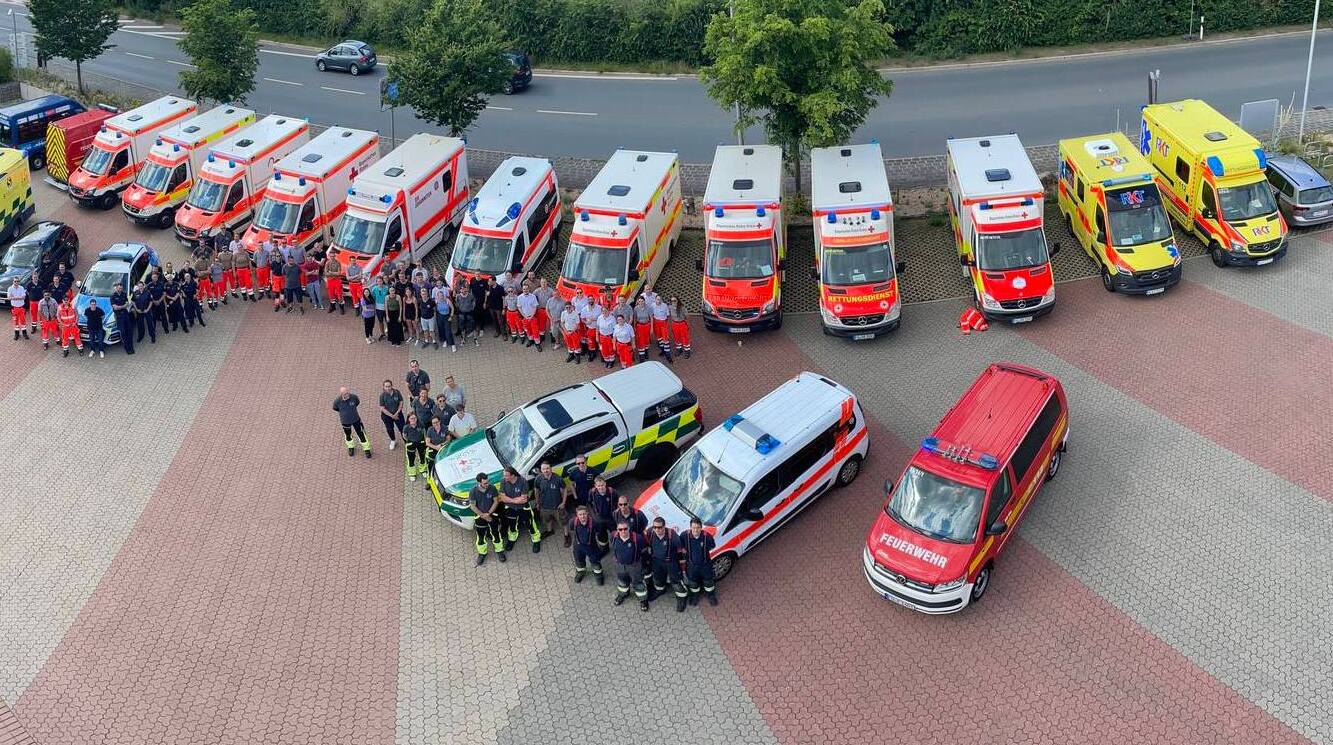
25. June 2024
Action day of the vocational schools for emergency paramedics
Regular training under conditions that are as close to reality as possible is essential to ensure that every move is right in an emergency. A wide variety of scenarios were therefore practiced at the action day of our vocational schools for emergency paramedics in Stein.From accidents at work with trapped persons to injured children on the playground and resuscitation, our students were able to apply what they had learned. A total of dozens of operations were simulated. Each station was supervised by experienced teachers from our vocational schools and practical instructors, so that the trainee emergency paramedics could be given detailed feedback immediately after the exercise.
Rare or particularly challenging cases were also on the program. For example, in the case of a home birth with complications for the mother, it was important to react correctly. Interaction with the fire department was practiced during the rescue of trapped workers. In cooperation with the police, we had to deal with an operation in which the treatment of injured persons was obstructed by troublemakers. This allowed our students to complete many intensive training sessions in a very short space of time – an important dress rehearsal shortly before the upcoming final exams.
Franken Fernsehen and Nürnberger Nachrichten, among others, reported on the day of action.
We would like to thank everyone involved, especially the town of Stein, the Stein fire department, the FORUM Stein, the Nibler group of companies, the Schwabach-Roth St John’s Ambulance and the Stein police station – without their fantastic support, the day of action would not have been possible in this form.

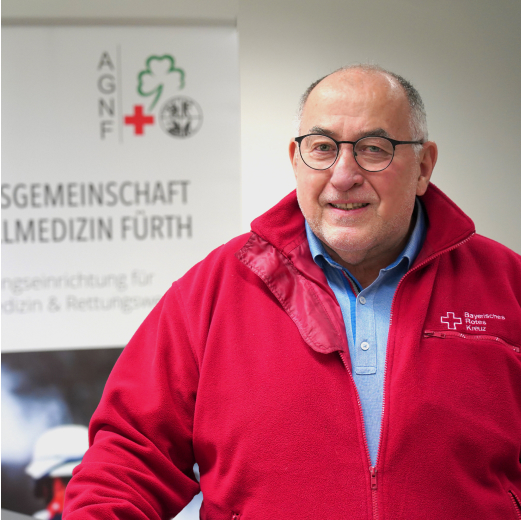
18. June 2024
58 years of voluntary work and AGNF board member since the very beginning – an interview with Arthur Sieder
Arthur Sieder can look back on 58 years of voluntary work. At the age of 70, he wants to take it easy and in future will concentrate on his tasks as a construction officer and crisis manager at BRK Fürth.As a BRK representative, he has been a member of the Management Board and now the Supervisory Board since the AGNF was founded. We are therefore all the more pleased that he will remain with us in his role at the AGNF.
What appeals to him most is the opportunity “to promote and maintain the proximity between BRK Fürth and AGNF. I am still active in various areas of the BRK and therefore believe I can continue to act as a mediator.” He is pleased that his “work on the Supervisory Board of AGNF will now also strengthen cooperation and collaboration between the two organizations” and is certain that “both BRK and AGNF can benefit from good networking.”
From major fires and floods to the coronavirus pandemic – as a disaster relief officer, Arthur Sieder has experienced emergencies, strokes of fate and tragedies at first hand. Despite all the suffering, there are moments that he particularly likes to think back on: “A few days ago, a BRK colleague of mine said in a newspaper interview that it is important for the helpers to be allowed and required to laugh every now and then, especially during longer missions, alongside the serious work. In fact, such moments were also important and formative during my missions in the 2002 and 2013 floods. During the often depressing and painful missions in the rescue service, it was also the quiet and calm moments after a mission.”
Especially little things like “the elderly lady who brought “cakes for the nice helpers” to our 70-strong support contingent at the registration head during the flood operation in Plattling in 2013″ remain fond memories for him.
Arthur Sieder came to volunteering in the traditional way “via first aid courses, paramedic training, sports field services and the slow introduction to the rescue service”, which were decisive for his many years of sustained work in acute and emergency medicine.
For young people who want to follow in his footsteps, he has the advice to “in addition to learning medical skills, gently teach your soul how to deal with the suffering and pain of others”. Because “perhaps this will help you to cope with the challenges and stresses of this job even after many years.” He also considers “continuous learning and further training in emergency medicine and disaster control” to be extremely important. “This is the only way to gain the necessary security and routine for an emergency – which may never happen, especially in disaster control.”
During his time as a manager at the BRK, he has always been concerned with recruiting young talent. He warns against “scaring away people interested in our work with the “statutory duties” as soon as they join. The fields of activity of the aid organizations are so diverse that it must be possible for interested members to decide for themselves in which areas they want to be active.”
He has found that interested people “do not want to be confronted with a catalog of duties right from the start”. Aid organizations in particular “need to offer flexible volunteering opportunities that enable young people in particular to combine their volunteer work with their studies, work and leisure activities.”
In his experience, modern means of communication and social media play a key role in this: “A strong presence on popular platforms can help to raise awareness of the organization’s work and appeal to young people.”
At AGNF, Arthur Sieder follows “all projects with great interest” and sometimes regrets “that active support for some projects fails due to age alone.” After FÜRTH SCHOCKT!, the starting signal has been given for ERLANGEN SCHOCKT! and other regions will follow. The educational offering was repositioned under the bildung37° brand. A new educational campus is to be built around the association’s headquarters in Stein and the vocational school for emergency paramedics located there. And our international commitment is attracting more and more attention.
Looking back, Arthur Sieder found the AGNF’s activities during the coronavirus crisis very exciting, as he “personally had the opportunity to actively support various projects in conjunction with the BRK.” In future, he will follow the “structural development and realization of the educational campus” with particular interest, if only because of his professional background as an engineer. In connection with the FÜRTH SCHOCKT! project, he would like to “continue to advocate for the BRK to contribute its existing expertise.”
When asked about his wishes for acute and emergency medicine and disaster control in and around Fürth, Arthur Sieder’s thoughts turn to improving equipment and strengthening volunteer work in society.
In terms of equipment, “continuous and sufficient funding from state and local authorities” would be essential to “ensure that rescue services and civil protection are always optimally equipped.” He would like to see “a similar commitment from the public sector to that of the fire departments.” Especially in times of increasing natural disasters and other emergencies, “it is important that our emergency services can respond quickly and effectively.” Because “an improved infrastructure and state-of-the-art technology would significantly increase operational capability and help to save lives and minimize damage.”
For him, strengthening volunteering in society is about “public recognition and appreciation”, for which “the Bavarian volunteer card is a good example.” He also believes that “promotion and support, possibly through financial incentives, tax relief or financial support for training and further education” are other key factors. And the “support from employers” makes it much easier to get involved as a volunteer.
We look forward to working with Arthur Sieder in the future and hope he continues to enjoy his work and the free time he has gained!

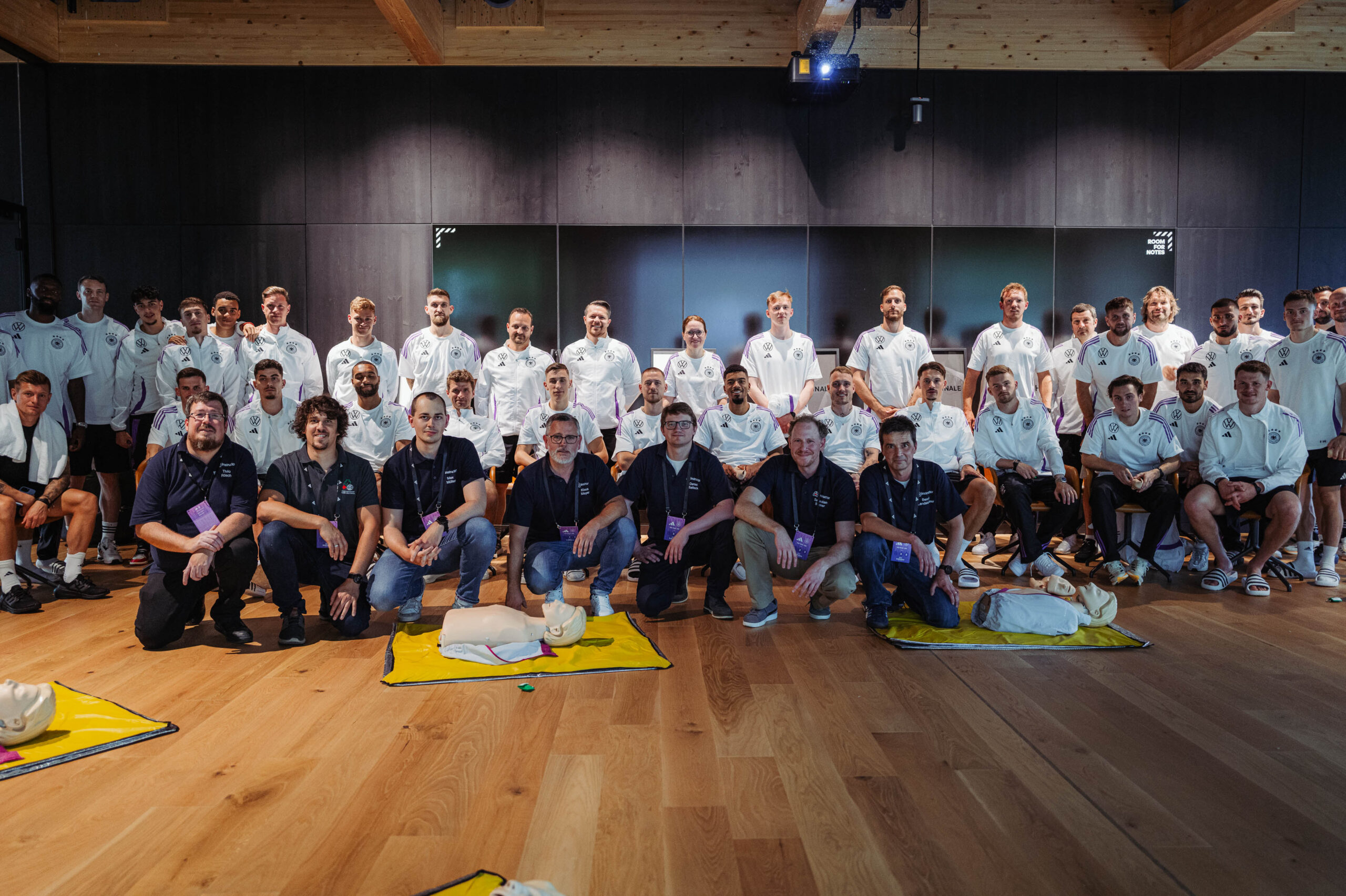
14. June 2024
AGNF team trains the DFB selection in resuscitation
As a course center of the German Resuscitation Council (GRC), the Arbeitsgemeinschaft Notfallmedizin Fürth e.V. (AGNF) trained the DFB players and the entire support team in resuscitation in Herzogenaurach.The campaign was part of a UEFA project in cooperation with the European Resuscitation Council (ERC), which began with GOAL (GO and save A Life) courses on resuscitation training for players, coaches, referees and staff at matches and tournaments in the run-up to the European Championships.
There was one scene from the last European Championship that most people will remember beyond the goals and chants: when Christian Eriksen collapsed in his Danish team’s group game, he had to be resuscitated on the pitch. Fortunately, he has recovered well and is once again in the Denmark squad.
As emergency care is not always available as quickly as in the stadium, numerous active and former professionals such as Erling Haaland, Ruud Gullit and Didier Deschamps support the “Get Trained, Save Lives” campaign, as part of which the ERC has now been able to train around 12,000 players, coaches and staff who are on duty at UEFA EURO 2024 in resuscitation.
A team from bildung37°, the AGNF competence center for acute and emergency medicine, provided training for the DFB team in Herzogenaurach. Both the professionals around captain Ilkay Gündogan and the coaching and support team learned the theoretical background of resuscitation and practiced on dummies in the event of an emergency.
“The players know exactly what to do on the pitch and are used to stressful situations. But when it comes to life and death, it’s a completely different kind of tension. Now you also have the right tactics when it comes to resuscitation,” explains Klaus Meyer, Chairman of the Management Board of the AGNF and head of the GRC course center in Fürth.
The DFB team is setting a good example, and fans have the chance to do the same as their idols in the fan zones at the venues and receive training in resuscitation. If you want to get started right away, you can learn the principles of resuscitation with prominent players in a virtual changing room on get-trained.com in just a few minutes.
As a GRC course center, bildung37° also offers a wide variety of course formats, from resuscitation courses for laypersons to advanced training for medical professionals. And this applies to the Fürth location in Würzburger Straße, Nuremberg or Bayreuth as well as beyond the metropolitan region, for example in Landshut or Passau.
Founded in 1989, the ERC now comprises 32 national councils, including the German Resuscitation Council, and publishes standardized resuscitation guidelines for the whole of Europe. With campaigns such as the annual one on 16.10. Restart a Heart day or the cooperation with UEFA, the ERC raises awareness for the topic of resuscitation and thus makes a central contribution to saving lives.

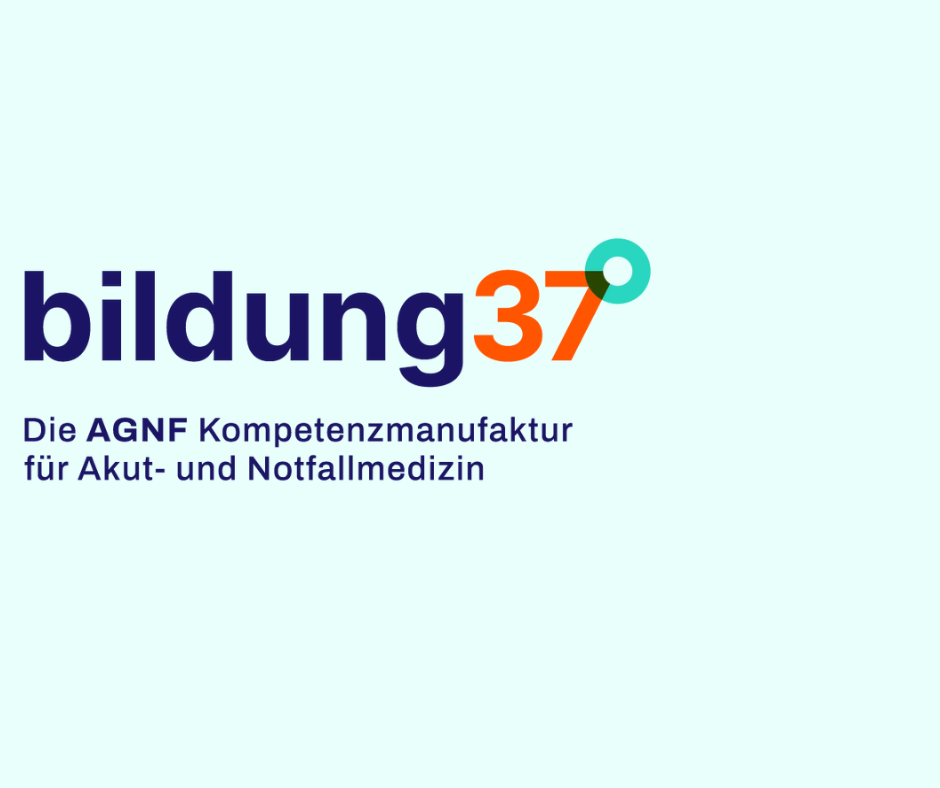
29. February 2024
AGNF is positioning its educational offering under the new bildung37° brand
The AGNF has developed considerably in recent years. In order to ensure that the core of the AGNF's activities - training and further education in the field of acute and emergency medicine - remains at the center of its communication and external perception, the AGNF is now positioning its educational offerings under the new bildung37° brand.“As AGNF, we are working to establish a high level of healthcare competence and care as the standard. This is only possible with excellently trained staff. We therefore want to make relevant information quickly and easily accessible to participants interested in our training courses. This is made possible by bildung37° as the AGNF competence factory for acute and emergency medicine,” says Klaus Meyer, CEO of AGNF, explaining the motivation behind the introduction of the new brand. The newly launched portal www.bildung37grad.de also provides information on training to become a paramedic and vocational training to become an emergency paramedic. Further education and training courses can be booked there easily and directly.
Bernd Obst, District Administrator of the Fürth district and member of the AGNF Supervisory Board, congratulated the team on the launch of the new educational brand: “I am delighted that the AGNF is constantly evolving. The new bildung37° brand gives AGNF’s educational offering even more visibility and thus ensures excellently trained specialists in the field of acute and emergency medicine – in the region and far beyond.”
The educational work is already emphasized by the brand name. The addition 37° figuratively stands for the optimum human body temperature and therefore the optimum environmental conditions for effective learning. Sebastian Habicht, Head of the vocational schools for emergency paramedics and Head of Training and Further Education, explains the background to the brand name: “Everyone who attends one of our training courses should feel completely at ease with us and experience an optimal learning environment – through good organization, good information, good teaching & presentation and a positive atmosphere.”

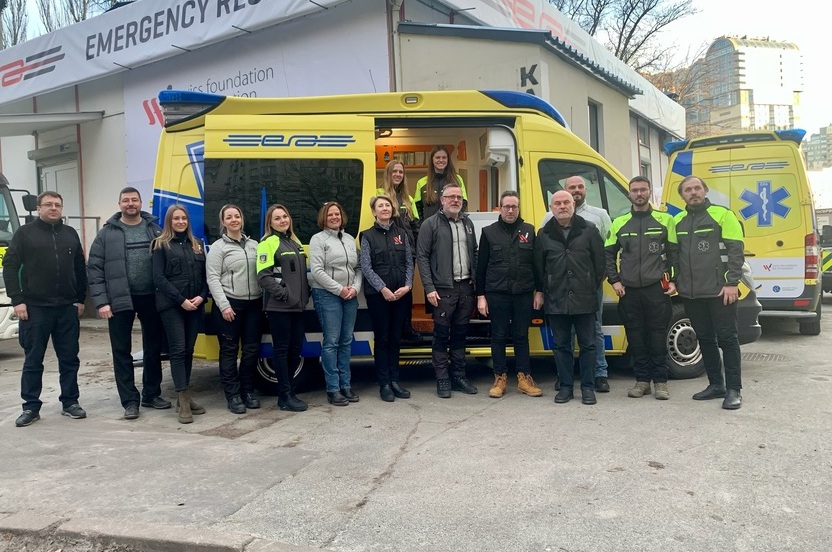
15. February 2024
Project trip to Ukraine successfully completed
From 28.1. A team from the AGNF traveled to Ukraine from 1 to 2.2.24. The trip took place as part of the Ukraine project, which the AGNF has been carrying out since April 2023 on behalf of the German Federal Ministry for Economic Cooperation and Development and which is funded by the Gesellschaft für internationale Zusammenarbeit (GIZ) as part of the Clinic Partnerships program.The project aims to strengthen the Ukrainian population’s ability to help themselves by qualifying multipliers in special first aid and establishing a rescue service specializing in the transfer of seriously injured and sick patients within Ukraine.
The AGNF team visited project partners in Lviv and Kyiv, where they also met with political representatives and healthcare stakeholders. The course of the project was presented and discussed there. Needs and prospects for future projects were also discussed.
Among other things, the project team carried out the journey with its own intensive care transport vehicle in order to gain experience in transporting patients over longer distances. Klaus Meyer, CEO of AGNF, was part of the team: “Above all, the visit is also a sign of appreciation for the local partners. Initiating a project from a safe distance is one thing. Experiencing the situation on the ground is something else.” Visits included the largest orthopaedic and rehabilitation center in Ukraine – Unbroken in Lviv, the project partners SFI Ukraine and LEF as well as the Special Training Center in Kyiv. A team of journalists accompanied the AGNF during the entire stay. The footage will be made into a documentary for ZDF and broadcast in a few weeks’ time.
The team was particularly impressed by how Ukrainian citizens manage to live a comparatively normal everyday life despite the war and the constant threat of air strikes – at least in the two cities they visited. In conversations, however, you also realize how two years of war weigh on people’s souls.

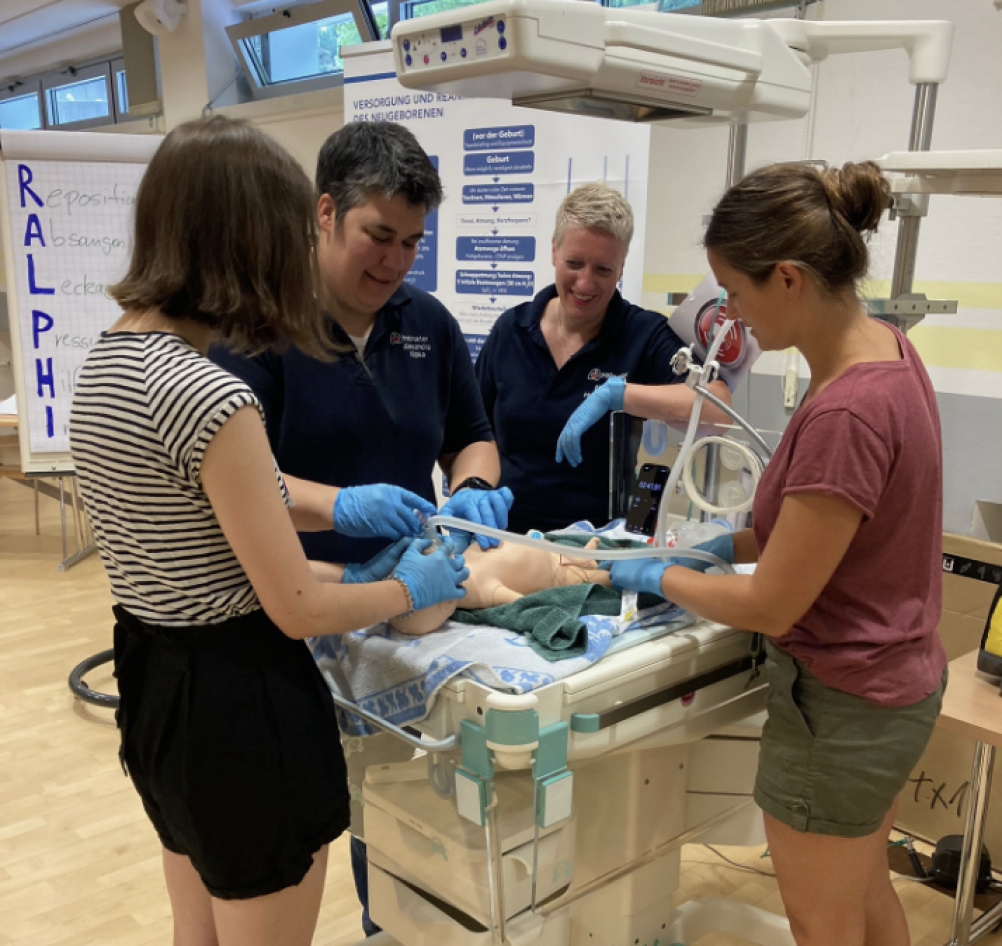
27. July 2023
Sankt Marien children’s hospital in Landshut – our future cooperation partner
As the responsible course center of the European Resuscitation Council (ERC) in northern Bavaria, the AGNF is always interested in establishing the certified course formats throughout Germany.We are therefore delighted that we will be able to work even more closely with our cooperation partner, the Sankt Marien children’s hospital in Landshut, in the future. The AGNF has already held regular training events for the hospital in recent years.
This has now culminated in an established cooperation. As part of this, the European Paediatric Advanced Life Support (EPALS) course format is offered to employees of the children’s hospital and all interested parties in Landshut. The EPALS courses are specially designed to train the advanced care of pediatric emergencies and are aimed at nurses, doctors and ambulance staff.
In addition, the children’s hospital will in future conduct its internal resuscitation training using the European Paediatric Basic Life Support (EPBLS) course format. It is worth noting that as part of this training, every employee is certified by trainers from the European Resuscitation Council. The EPBLS course covers the basic measures for resuscitation of children and infants as well as the early recognition of critically ill children.
The Sankt Marien Children’s Hospital will be able to offer the EPBLS course format for its employees independently in the future. To make this possible, eleven employees at the children’s hospital were trained as EPBLS instructors in June 2023. This instructor training follows an international standard, includes a logical and stringent didactic concept and is also certified by the ERC.
We are delighted to have gained a strong cooperation partner in the region with the Sankt Marien Children’s Hospital in Landshut!

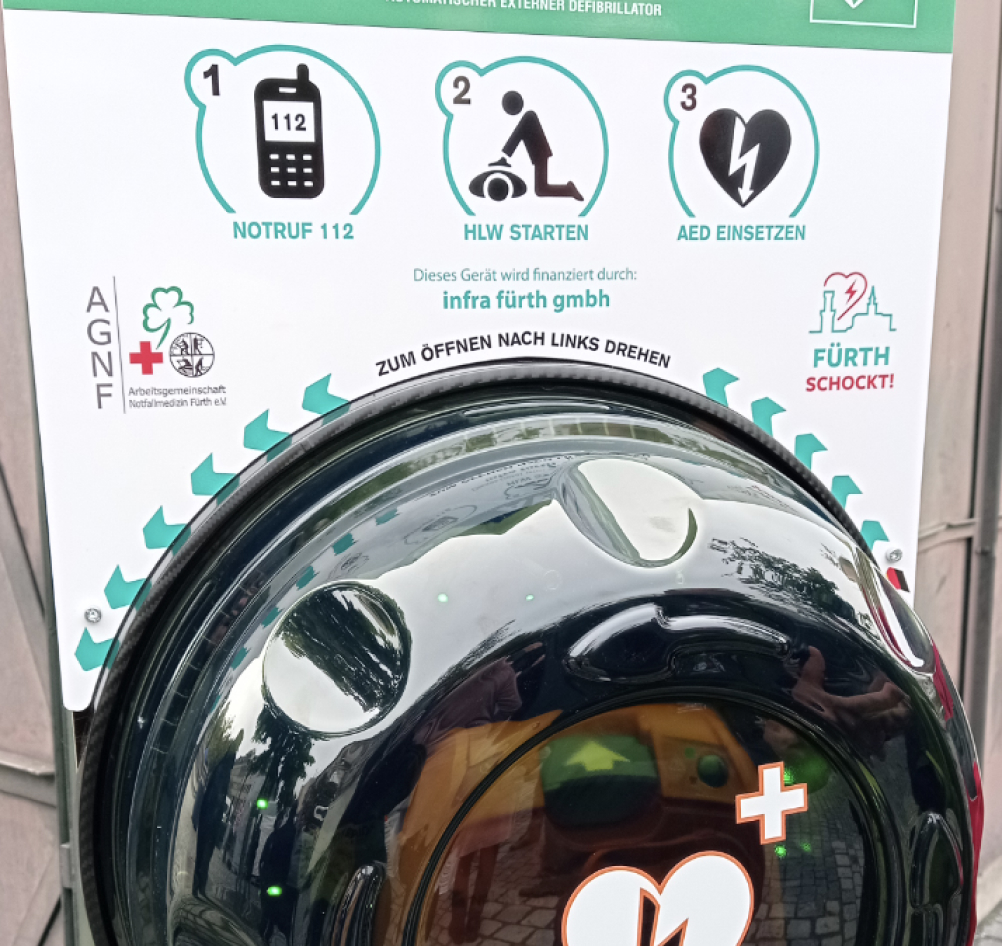
23. September 2022
Project launch “FÜRTH SCHOCKT!” for the week of resuscitation
The "Fürth SCHOCKT!" project aims to improve the availability of publicly accessible AED devices (Automated External Defibrillator) in the city and district of Fürth. This should significantly improve the chances of survival for patients in cardiac arrest!A comprehensive AED structure is a key factor in improving survival after cardiac arrest. The professional rescue service takes an average of 8-10 minutes to arrive. For this reason, first aiders (e.g. relatives, colleagues, witnesses) play a decisive role in resuscitation by acting safely. There are more than 70,000 cases of sudden cardiac death in Germany every year. Statistically, this amounts to 180-220 people affected per year in the city and district of Fürth. Only a few survive such an event. The aim is to raise public awareness of the issue and reduce the inhibition threshold for using an AED in an emergency. “50, perhaps even 100 of these people could survive each year if we succeed in improving the conditions in the city and district of Fürth,” says Klaus Meyer, Chairman of the AGNF, which has taken over the project management on behalf of the city and district of Fürth.
There are already around 150 AED devices in the city and district of Fürth, but only 10 of them are public and therefore always accessible to first aiders. The project aims to establish a network of around 250 publicly accessible devices in the coming years. It is not just the purchase of the device that is involved. It must also be stored protected from the weather in a heated and clearly visible box, the necessary maintenance intervals must be completed, consumables replaced and a battery replacement financed after four years. A special feature of the Fürth project is that all AED devices are equipped with a special chip that enables live geodata tracking. This means that the AGNF is always informed whether a device is working properly, what the battery charge status is, whether it is being used and where the device is currently located. CardiLink from Fürth is contributing this innovation. After use, the device is made ready for operation again and is available for use on site after a short time. All these services were previously the responsibility of the owner, which often prevented them from being placed in public spaces.
“As far as we know, the “Fürth SCHOCKT!” project is the only project in Germany to date with such a comprehensive range of services and solutions,” says Klaus Meyer.
AED sponsors are being sought who are willing to finance a publicly accessible device. For example, at a company location, at a sports club, the church community or through a private donation. This can be taken over for 4 or 8 years.
In addition to the AGNF, the district and the city of Fürth, other partners are also supporting the project. The Bavarian Red Cross District Association of Fürth, the city and district fire departments, the Fürth Hospital, the Fürth Doctors’ Network, the “Fürth drückt!” initiative, the Greuther Fürth football club and infra fürth as an infrastructure and media partner are also involved.
In the coming year, the project is to be supplemented by a smartphone-based alerting system for first responders. The aim is to activate pre-registered first aiders in the immediate vicinity of an incident who can quickly initiate resuscitation measures. A very successful project that has been established in Freiburg for 6 years entitled “Region of Lifesavers” serves as a blueprint.

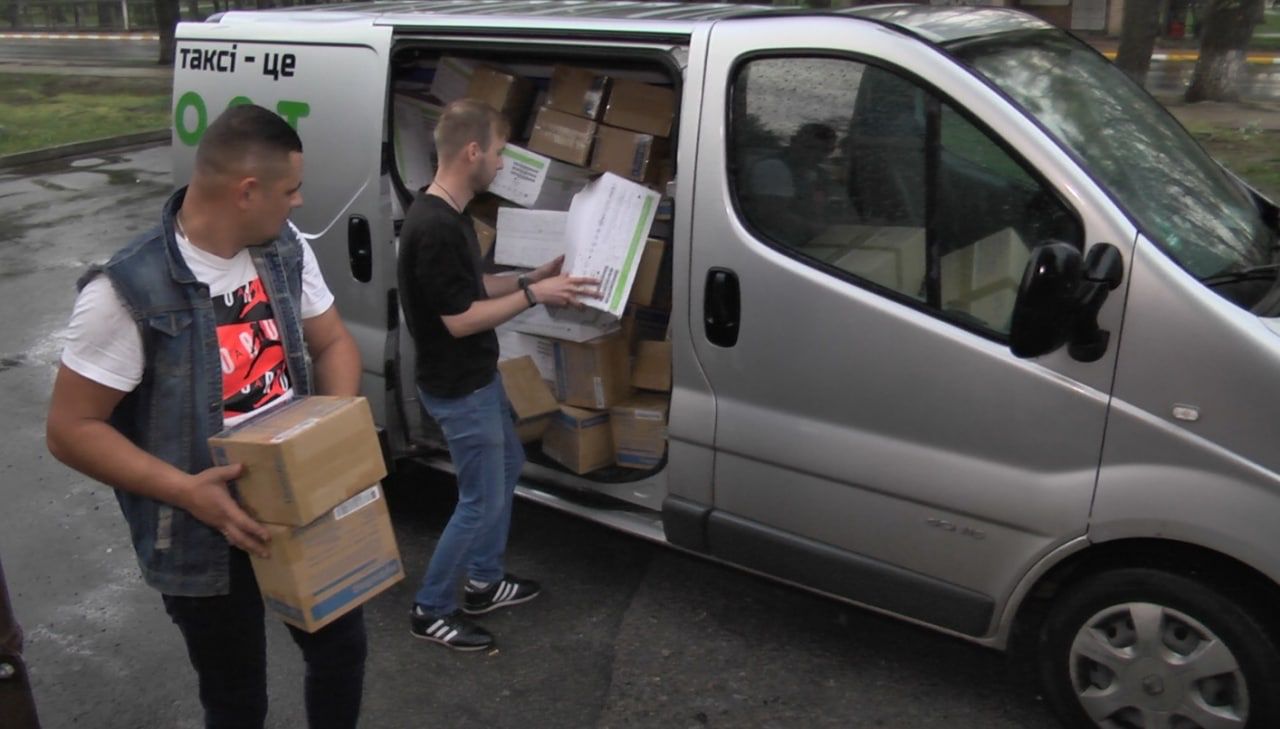
9. September 2022
Update: Ukraine aid project
Where we have already been able to help and where we want to help in the future. Since the start of the Ukraine aid project in March 2022, which was initiated in response to Russia's military incursion, the Arbeitsgemeinschaft Notfallmedizin Fürth e.V. has been able to make a valuable contribution to improving the medical care situation in Ukraine with the help of your support.The generous donations made it possible to procure and deliver almost 10 tons of relief supplies, including medicines and medical consumables for the care and treatment of sick and wounded people as well as hygiene articles and medical equipment. As part of three large transport trips between March and May, more than 15 clinics in the greater Kiev area, Kharkiv, Irpin, Drohobych and Zaporizhzhya were supplied with urgently needed relief supplies. Collaboration with local doctors and newly acquired cooperation partners helped to plan donations in line with needs and targets.
The personal impressions and testimonials from those affected during the tours continue to fuel the commitment of the AGNF project members and so even today, 6 months after the start of the initiative, all resources are being activated to help the people in Ukraine. In July, the AGNF was able to provide medicines worth over 6,000 euros at short notice for an aid shipment to the conflict region of Luhansk. A few weeks later, the BRK Fürth organized a large-scale donation campaign in which 28 used care beds, around 50 wheelchairs and walkers and hospital furniture went to a clinic in Drohobych. The AGNF used its network to establish contact between donors and recipients and supported the campaign with additional manpower.
In addition to the contribution we can all make today, we are already thinking one step ahead as part of the aid project. What will it take to build a new medical infrastructure in Ukraine after the war? And how can the Arbeitsgemeinschaft Notfallmedizin Fürth e.V. (Fürth Emergency Medicine Working Group), as an educational institution, support the local players in this challenge? There is still much to do and the AGNF gratefully accepts your continued support, with the promise that all donations will be passed on as direct added value to the people in Ukraine.


4. July 2022
Train for a demanding job!
Big action day at the vocational school for emergency paramedics. The AGNF is one of the largest institutions for training and further education in Bavaria and operates two state-recognized vocational schools for emergency paramedics.The profession of emergency paramedic has only existed since 2014. Emergency paramedics are trained for three years and are the highest non-medical qualification in the German rescue service. Today, they take care of many emergency patients independently, such as administering pain medication. They also provide complex life-saving measures, e.g. administering emergency medication in the event of a heart attack, until an emergency doctor arrives. High-quality and intensive training is therefore necessary to fulfill this task profile.
The current class of emergency paramedics will complete their training in September 2022. In preparation for the upcoming state examination and the demanding everyday working life, an action day was held at the AGNF at the end of June. The students of the final year each occupied an ambulance in threes and had to deal with different missions in the city area, accompanied and observed by their practical instructors and the teachers of the vocational school. The simulated missions are then evaluated and debriefed with the team.
Such a training day offers the unique opportunity to experience school and work in a safe environment and still have to work independently. We were supported in the organization of the action day by the rescue services of the BRK, the JUH and the ASB, who provided emergency vehicles. In addition, the town of Stein provided premises to enable operations to be carried out at real locations. The Stein fire department supported the day of action with personnel and equipment. A total of over 50 people were involved.

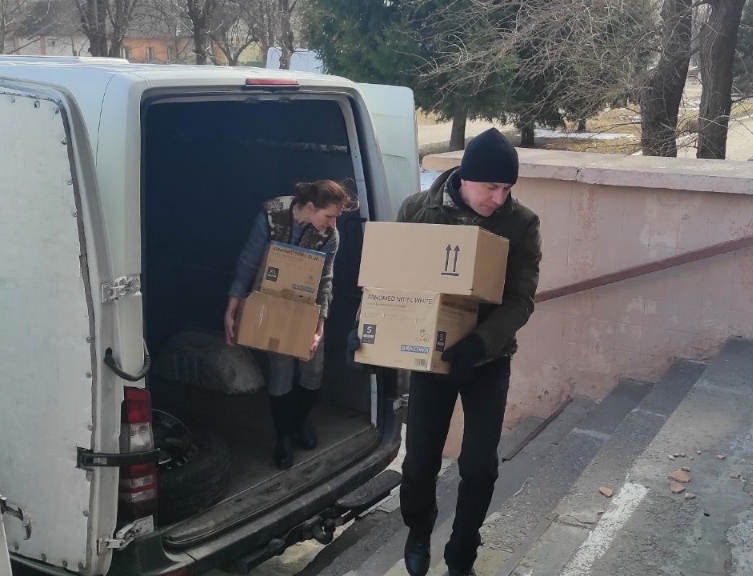
11. March 2022
Aid delivery for Ukraine
Dear colleagues, We have succeeded in organizing the first medical supplies and bringing them to Ukraine. Last weekend, ITLS Germany and the AGNF initiated an appeal for donations for a hospital in the greater Kiev area, to which a personal contact exists through Jurij Kryvonos , a pediatrician and ITLS instructor working there.We have spent the last few days procuring the necessary medicines and medical supplies. The problem here was that various things are already sold out across Europe, such as special products for hemostasis.
Nevertheless, a delivery weighing almost 1.5 tons was put together last Wednesday and loaded onto two vehicles. We would like to take this opportunity to thank the many donors, donors in kind and the AGNF employees who helped with the procurement and loading. We would particularly like to thank the Fürth Clinic, SIMple medics, Bexamed and Orange, who all supported us with generous donations in kind. We would also like to thank everyone who diligently shared our article and thus brought the campaign to the attention of the general public. We were also very touched by the personal messages we received, so many of you offered your help. Within just ten days, we were able to successfully carry out this fantastic aid campaign thanks to the fantastic commitment of each individual. Many thanks to all of you.
On Thursday morning at 9 a.m. we set off for Ukraine. The journey went smoothly and we reached the Ukrainian border at around 20:00. For their part, the Ukrainian colleagues started in the Kiev region with two vehicles. Contrary to plans, colleagues were not allowed to enter the country for the handover at the Korczowa border crossing. So we first had to “travel out” to the Ukrainian side to be able to hand over the goods in the “neutral zone”. Shortly after midnight everything was done and our contact Yuri Kryvonos, the pediatrician from the Kiev area, was very happy about the first aid delivery!
The transport has now safely reached the greater Kiev area and the delivery has already been distributed to the individual functional areas. We received very, very positive feedback from our colleagues on site
We will now continue to determine the needs in the hospital, but also in other hospitals, and organize a second transport as soon as possible.
Je suis Ukraine!

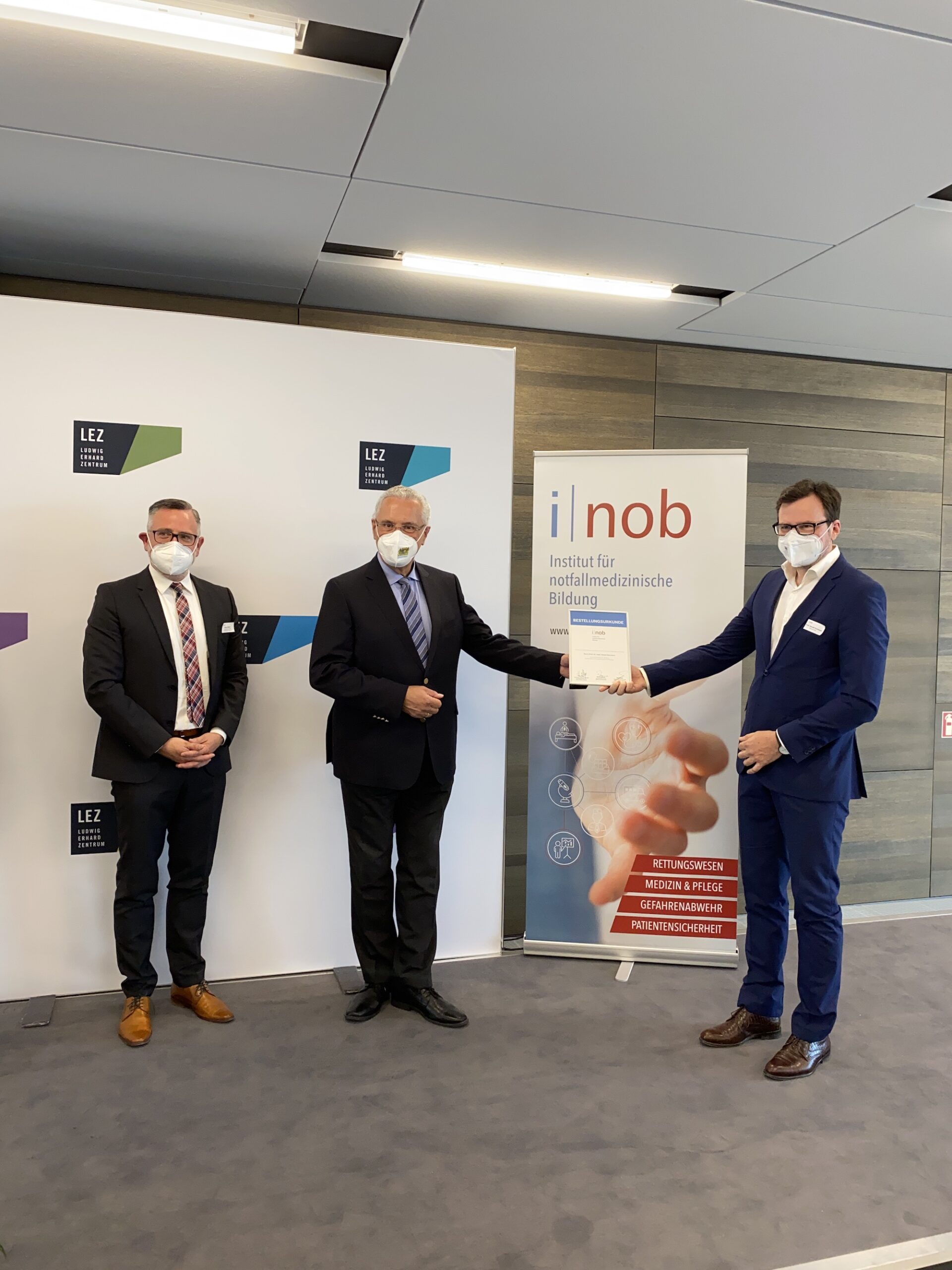
25. May 2021
Innovative and future-oriented
The need for modern and innovative further education and training opportunities for medical professionals is constantly increasing due to the rapid progress in the healthcare sector.This is why Fürth Hospital and the Fürth Emergency Medicine Working Group (AGNF), as established players in the healthcare sector, have taken the initiative to create a joint education, innovation and science platform for medical, nursing, rescue and emergency response professionals in the form of the Institute for Emergency Medical Education, with the ultimate aim of continuously improving patient safety.
“With the founding of INOB, we have succeeded in taking an important and forward-looking step in the education market and expanding the emergency medicine education market here in the Nuremberg, Fürth, Erlangen metropolitan region alongside the Institute for Emergency Medicine and Medical Management (INM) in Munich,” says Managing Director Oliver Riedel.
The SIM box, which enables virtual and practical patient simulation, is a unique tool in Germany for the continuous further training of medical staff: using audiovisual projection and unique soundscapes, individually adapted, realistic virtual learning environments are presented in which medical professionals train emergency situations. Other important training topics include the promotion of intercultural competence in emergency situations and de-escalation in emergency situations.
Bavaria’s Minister of the Interior, Joachim Herrmann, also emphasized the importance of modern training opportunities at the founding event of the Institute for Emergency Medical Education in Fürth. “The coronavirus pandemic shows us how important a functioning and effective healthcare system is. Well-trained specialist personnel are indispensable. We are already very well positioned here in Bavaria,” says Herrmann.
In addition to establishing high-quality educational programs and innovative research projects, the INOB is pursuing the expansion of a strong network and links to university structures. Ansbach University of Applied Sciences and the Wilhelm Löhe University of Applied Sciences in Fürth have been permanent cooperation partners of the INOB from the very beginning.

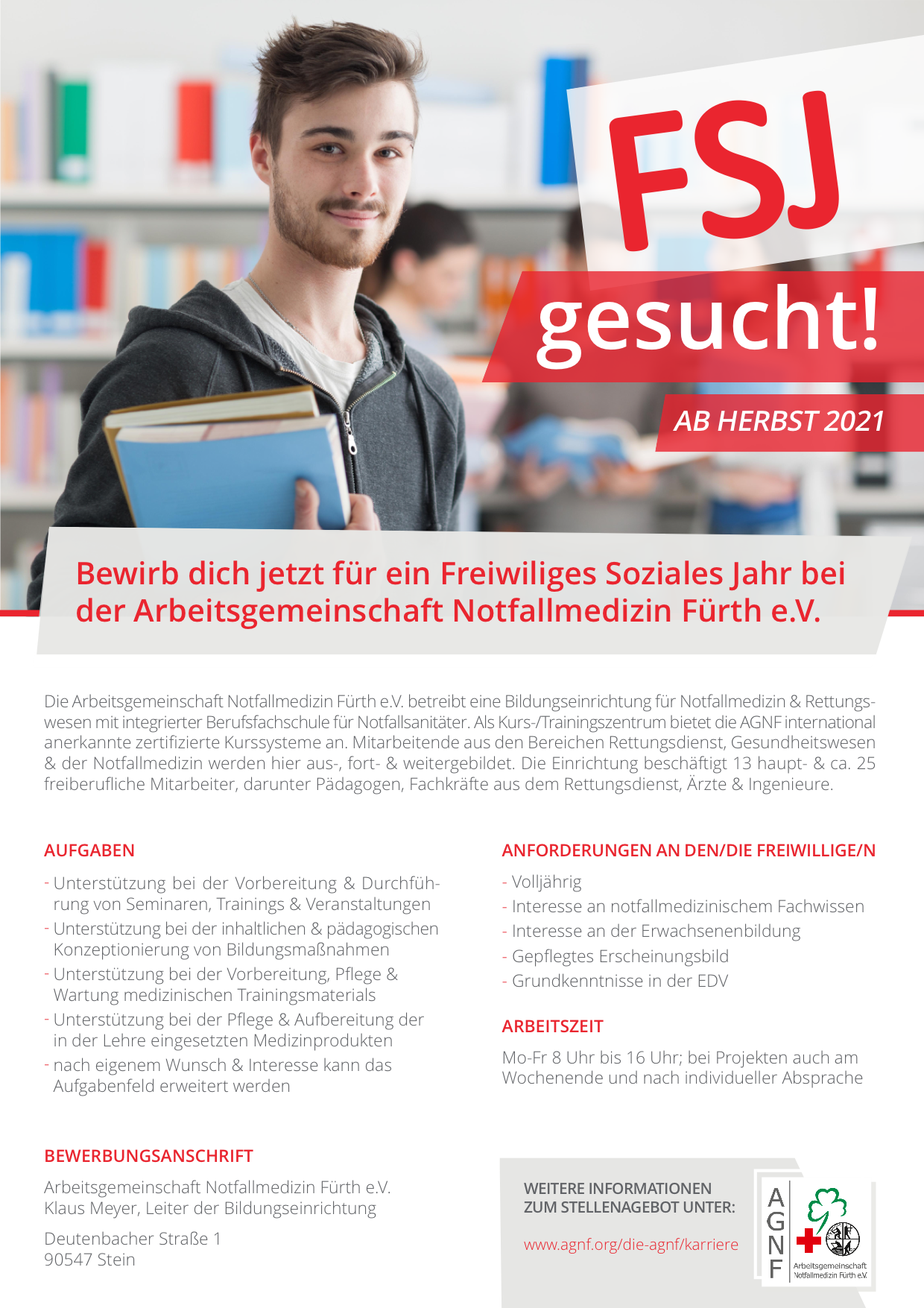
5. May 2021
Voluntary social year at the AGNF
Not everyone knows what they want to do immediately after leaving school, training or studying. An FSJ gives you the opportunity to use the time until your next big step in life in a meaningful way and at the same time make a valuable contribution to society.At the AGNF, you can spend a year getting to know educational work at first hand. We organize a variety of different emergency medical training courses for doctors, ambulance staff, nurses and many other professional groups and run a vocational school for training to become an emergency paramedic.
If you are interested in adult education and emergency medicine, send us your application!
Our team is looking forward to meeting you!
Please send applications to:
Emergency Medicine Working Group Fürth e.V.
Klaus Meyer, Head of the educational institution
Deutenbacher Street 1
90547 Stone

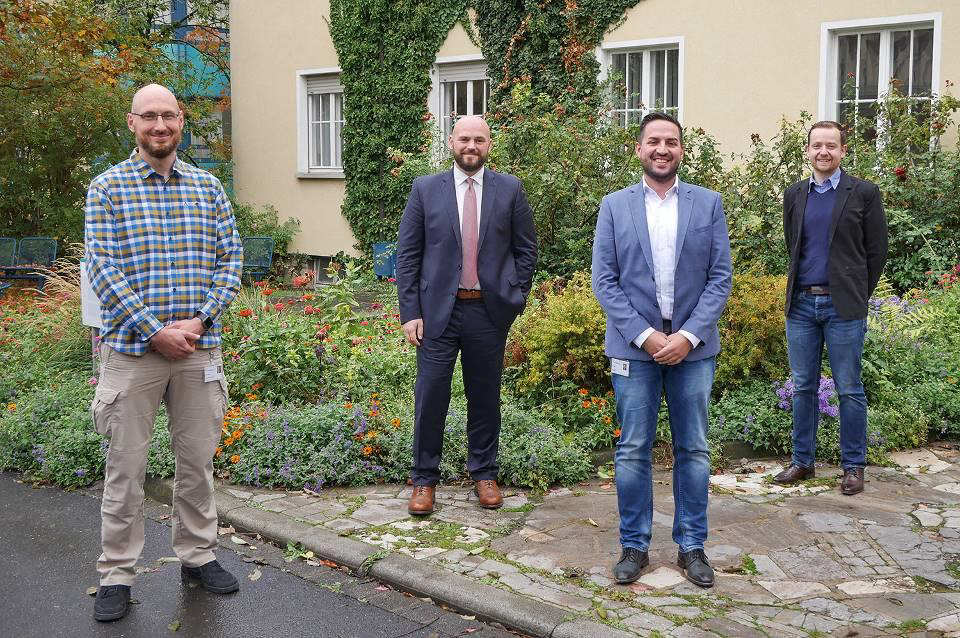
11. January 2021
Prepared for an emergency
The Klinikum Würzburg Mitte (KWM) has concluded a cooperation agreement with the Arbeitsgemeinschaft Notfallmedizin Fürth e.V. (AGNF) for the training and further education of medical staff. As an official course location, the hospital now regularly hosts training courses for doctors, nurses and other medical professionals at the Fürth training center.Klinikum Würzburg Mitte is the official venue for resuscitation training courses
The “Newborn Life Support” (NLS) and “Advanced Life Support” (ALS) courses are offered, which provide training in advanced resuscitation measures for newborns and adults. In addition to imparting basic theoretical knowledge, the training courses are characterized above all by a high practical component.
Doctors, nursing staff, midwives and rescue service personnel work together on an interdisciplinary basis during the realistic training. The exercise situations reflect the everyday life of all professional groups and are intended to improve cooperation in real emergency situations.
The courses are aimed at all interested parties from hospitals, emergency services and private practices. In line with the current situation, the courses are held in compliance with strict hygiene concepts. Further information and online registration can be found on the AGNF website (www.agnf.org).
Photo:
From left to right: Christofer Krieg, Emergency Coordinator at the KWM, Sebastian Habicht, Head of Training and Further Education at the AGNF,
Simon Veit, Assistant to the Director of Medicine at the KWM, and Dominik Landeck, KWM Managing Director (Photo: Klinikum Würzburg Mitte)


9. October 2020
Fundraising campaign for Uganda
In 2020, we trained over 160 employees & 15 instructors in Uganda as part of the ERC course formats. Now we would like to help our partners set up their new course center so that they can independently train other emergency medical staff.With our project “Advanced Life Support (ALS) Courses in Uganda”, we have trained over 160 people and 15 instructors in Advanced Life Support together with our local partner, Makerere University, and the European Resuscitation Council (ERC). The trained instructors will soon be able to conduct certified resuscitation courses completely independently of us as part of the ERC course format. The standardized and continuously modernized ERC course formats, which are already being taught throughout Europe, will thus be established in Uganda in the long term. We are delighted that the trained local instructors now want to get started with their own course center! The building has been rented, the first courses are planned and the know-how and the will are there to improve emergency care in Uganda in the long term. The only thing missing now is the interior design – we pray for your help. The building has several course rooms, an office, kitchen, storage rooms and toilets. In order to operate the course center and expand the range of courses on offer, our project partners urgently need the following equipment:
60 classroom chairs 10 €/each
10 classroom tables 30 €/each
3 office desks 100 €/each
4 office chairs 40 €/each
2 office cabinets 50 €/each
1 Entrance area table 100 €/piece
1 Entrance area chair 50 €/piece
5 Whiteboard 100 €/each
Donate now for “Emergency medicine education in Uganda – furniture for course center” at our partner betterplace.org
Information about the predecessor project, Advanced Life Support (ALS) courses in Uganda, can be found here.
You can find the Facebook page of the course center here.


17. May 2020
The AGNF in times of Covid-19
How can the world turn 180 degrees in just a few weeks? Everyone has probably asked themselves this question in the last few days. We also rub our eyes in amazement. It's not just the professional implications that concern us, but of course each and every one of us also has a private life. And there too, there are challenges to overcome, such as looking after children or caring for the elderly.We have canceled many of our Facebook posts that were planned for these weeks. They would have been out of date and would not have done justice to the current situation. Today we would like to give you an insight into our CORONA everyday life. The school closures led to some new challenges for our team, especially for our teachers at the vocational school for emergency paramedics:
– How do we maintain close contact with our students?
– How can the individual learning process continue to be supported and positively influenced?
– Which teaching methods can be used sensibly and successfully over a greater distance?
The intensive use of our online learning platform, as well as the introduction of telephone and video conferences between class leaders and their students, were the first steps towards the most effective possible compensation for the canceled lessons.
Our teachers also provide their students with learning packages that present the content of the teaching phases in a condensed form and enable them to work on tasks from home. The use of e-learning in combination with regular telephone and internet conversations enables us to provide our students with intensive support. We try to do as much as possible from our home office.
In the area of further education and training, we are working intensively on new and proven concepts, striving for improvements and updating them. In addition to introducing new training courses, such as “Hygiene Officer in Healthcare”, we are primarily developing our patient safety offering and our SIMBULANCE.
As a course center of the European Resuscitation Council (ERC), we prepared intensively for the publication of the guidelines in October 2020. In addition to the GRC Resuscitation Dialogue in Cologne, a satellite event was planned in the greater Nuremberg/Fürth/Erlangen area. Last Friday, the publication of the new guidelines was postponed by one year.
At the beginning of last week, we provided two of our ventilators to a peripheral clinic on request. One of them is already in use in an intensive care unit, while the second is available for the emergency care of patients. Even if the occasion is not particularly pleasant, we are still pleased that our appliances are being put to more sensible use during this time than standing in stone in the cellar.
Next week, an outpatient care center will go into operation in the district of Fürth. This should provide additional medical capacity at the height of the pandemic, which is expected to reach us in the coming weeks. We provide conceptual and organizational support and are also involved in operations.
What is your situation? What has changed for you in the last few weeks? Write us your impressions and experiences.
Stay healthy everyone and hope to see you soon, ¬
Your team of the Working Group for Emergency Medicine Fürth e.V.


The AGNF in times of Covid-19
In order to cope with the COVID-19 pandemic, it was decided to set up so-called priority practices in every district or independent city in Bavaria. The district of Fürth reacted very quickly and opened such a practice in Cadolzburg at the end of March.The district of Fürth commissioned AGNF with the planning and implementation. Within a week, our employees at the Dillenberg School Center in Cadolzburg worked hard to prepare everything for commissioning. It was important to ensure that there was no overlap between potentially infectious patients and pupils, even when school resumed. This could be ensured with a triage (patient triage) upstream of the building, spatially separated treatment rooms, as well as a corresponding control of the patient flow via separate entrances.
Potentially infected citizens were registered via their GP or contacted the practice directly by telephone to make an appointment. As a rule, patients could be treated in the practice on the same day. On arrival, the patient was triaged according to the probability of a COVID-19 infection (according to the RKI scheme) and the medical urgency (adapted ESI triage concept).
If the infection triage was positive, the patient was examined under full protection by a doctor and a healthcare professional in a separate treatment area. A swab test for SARS-CoV-2 was also routinely carried out and the test results were often available the following day. Patients with corresponding respiratory symptoms were referred directly to clinical care.
Fortunately, many of the patients only showed moderate flu-like symptoms. These patients were often able to remain in home quarantine. Patients who were not suspected cases were treated in the building. All the resources that are found in a GP practice were available there. In detail, these are
Laboratory diagnostics
12-lead ECG
Ultrasound
Various rapid laboratory tests
The daily utilization of the practice fluctuated greatly. On some days, up to 30 patients were examined and treated. However, due to the nationwide lockdown, the number of COVID-19 cases in the district of Fürth is fortunately declining. This helped to avoid overloading medical care capacities. Fortunately, the district of Fürth is therefore currently able to suspend the operation of the Cadolzburg specialist practice.
For us at AGNF, this was and is an interesting and exciting change from the familiar and routine of everyday education. It was also very important to us to make a contribution to society in the current crisis situation.
